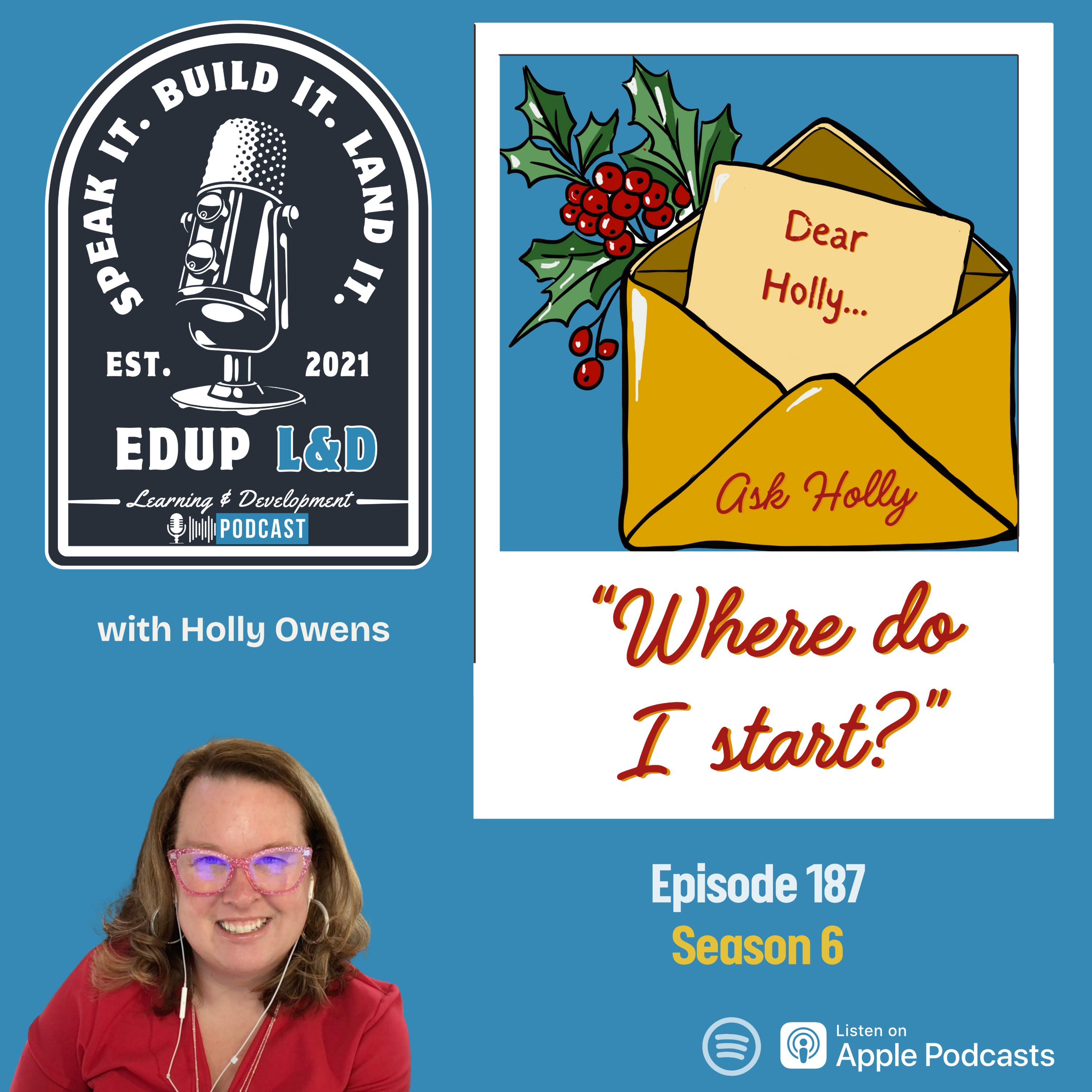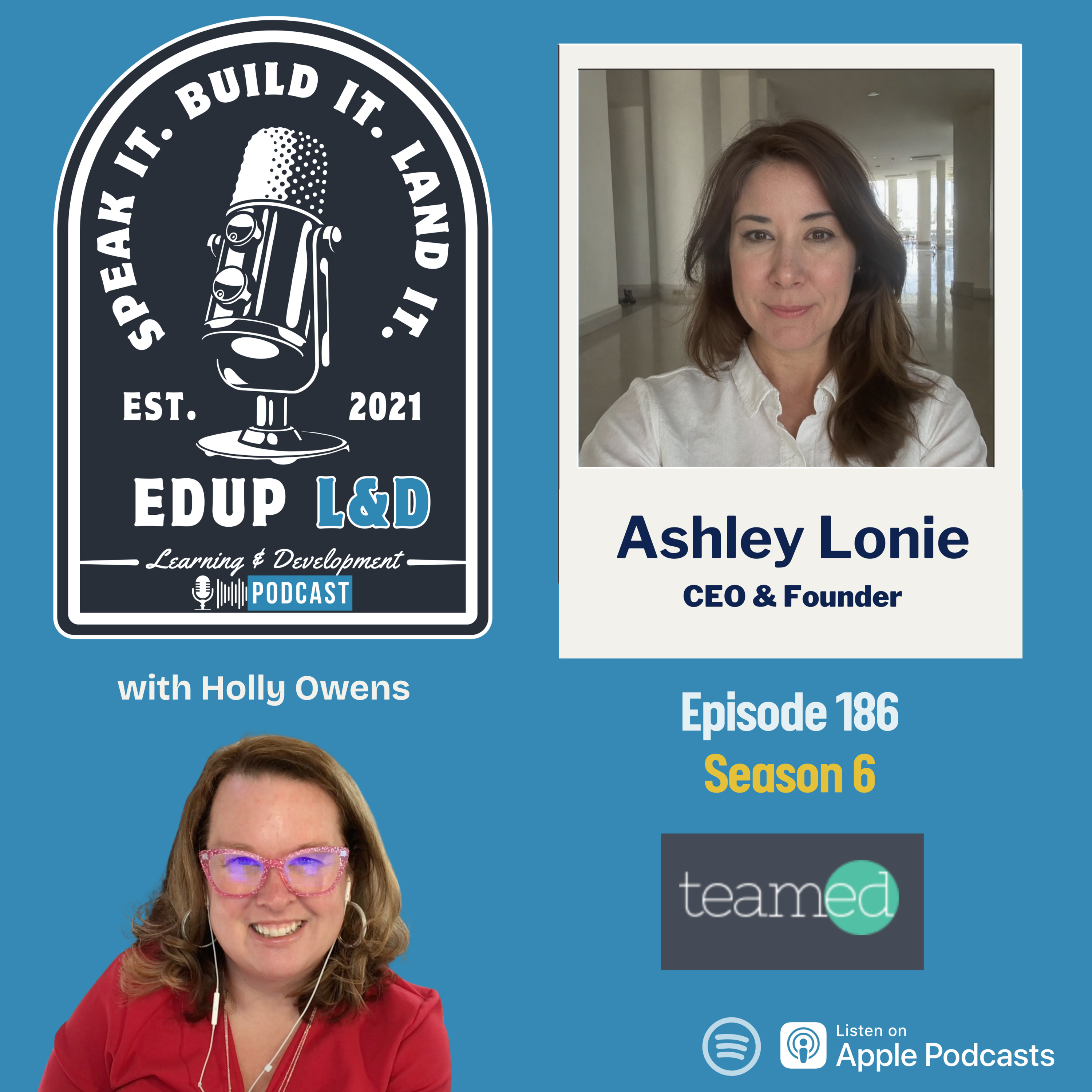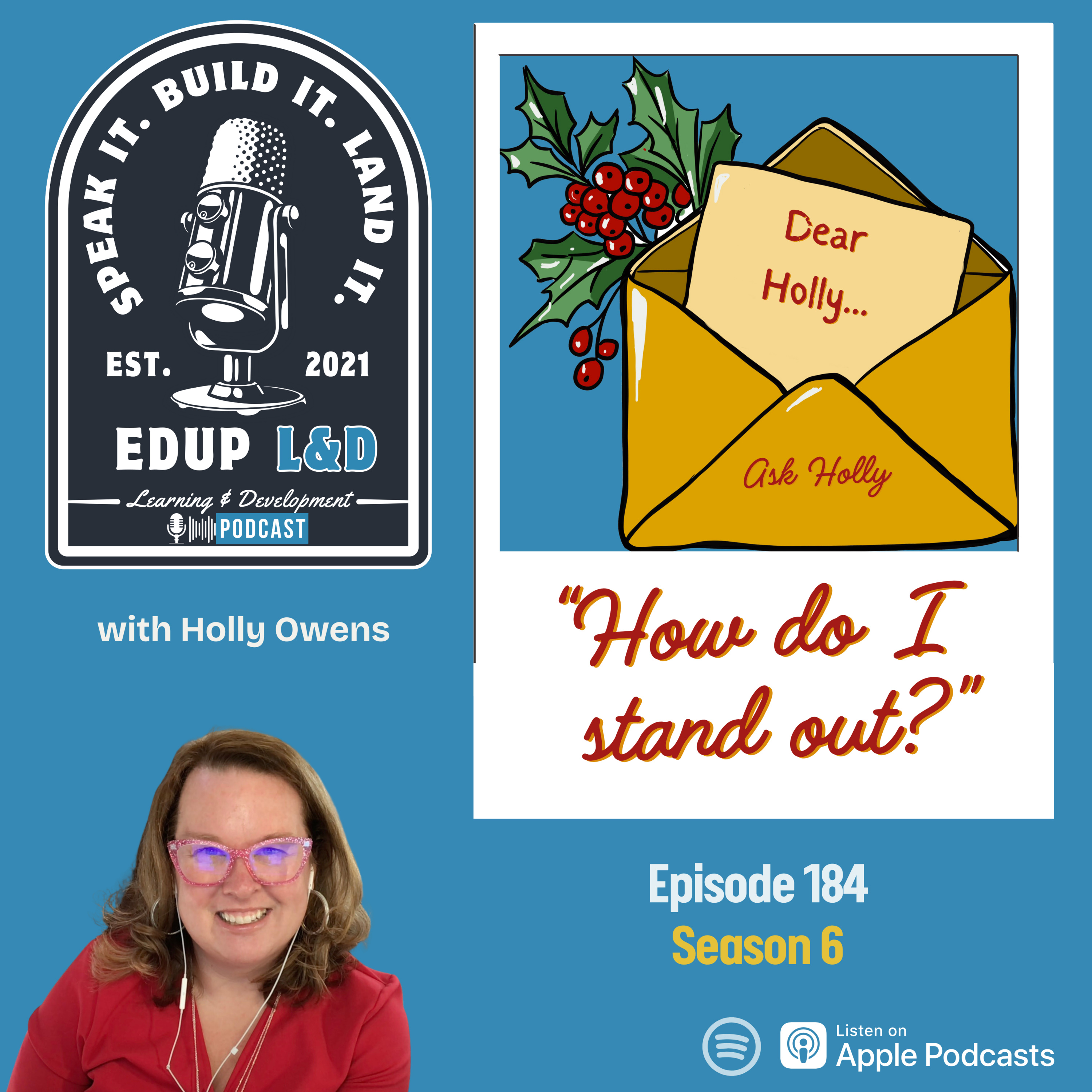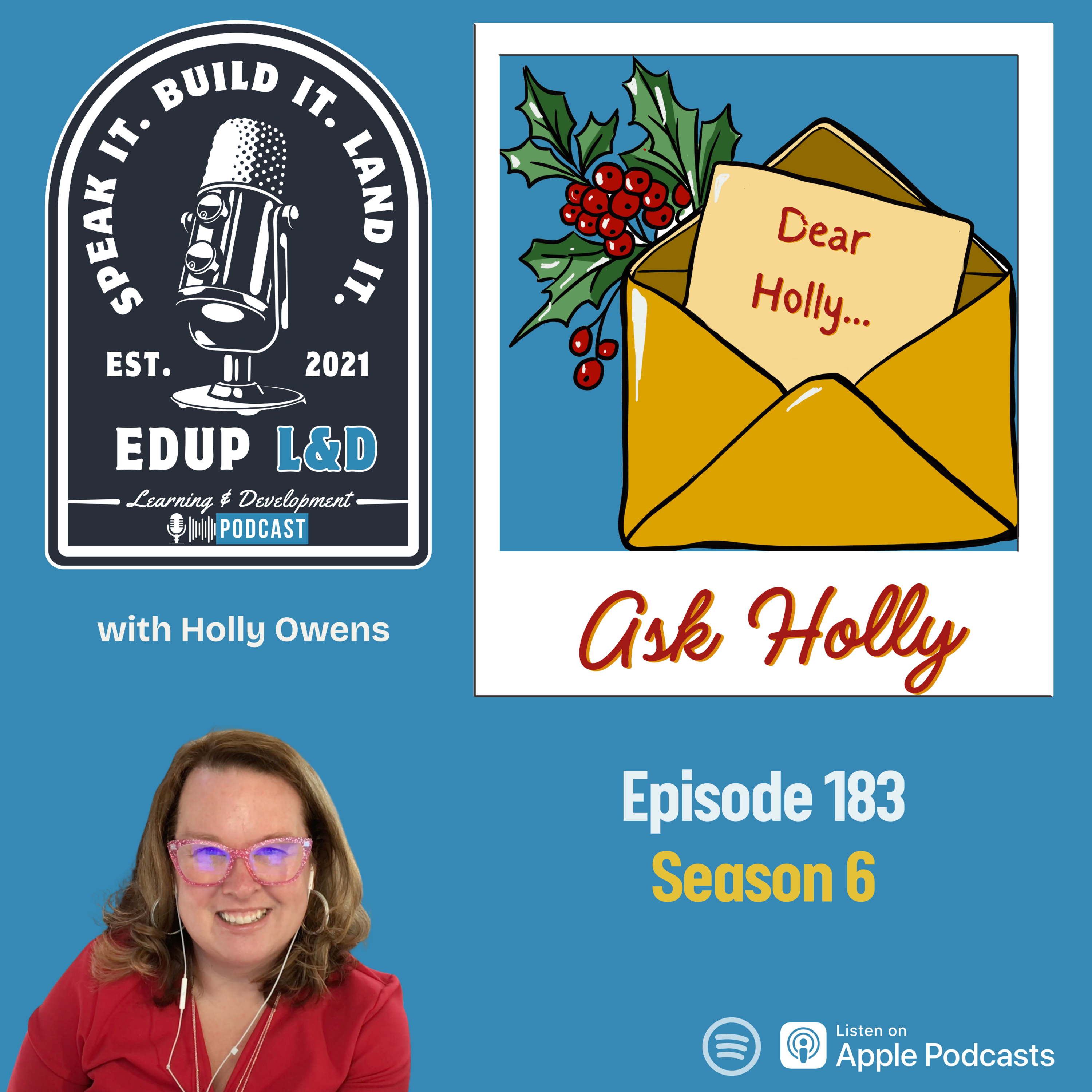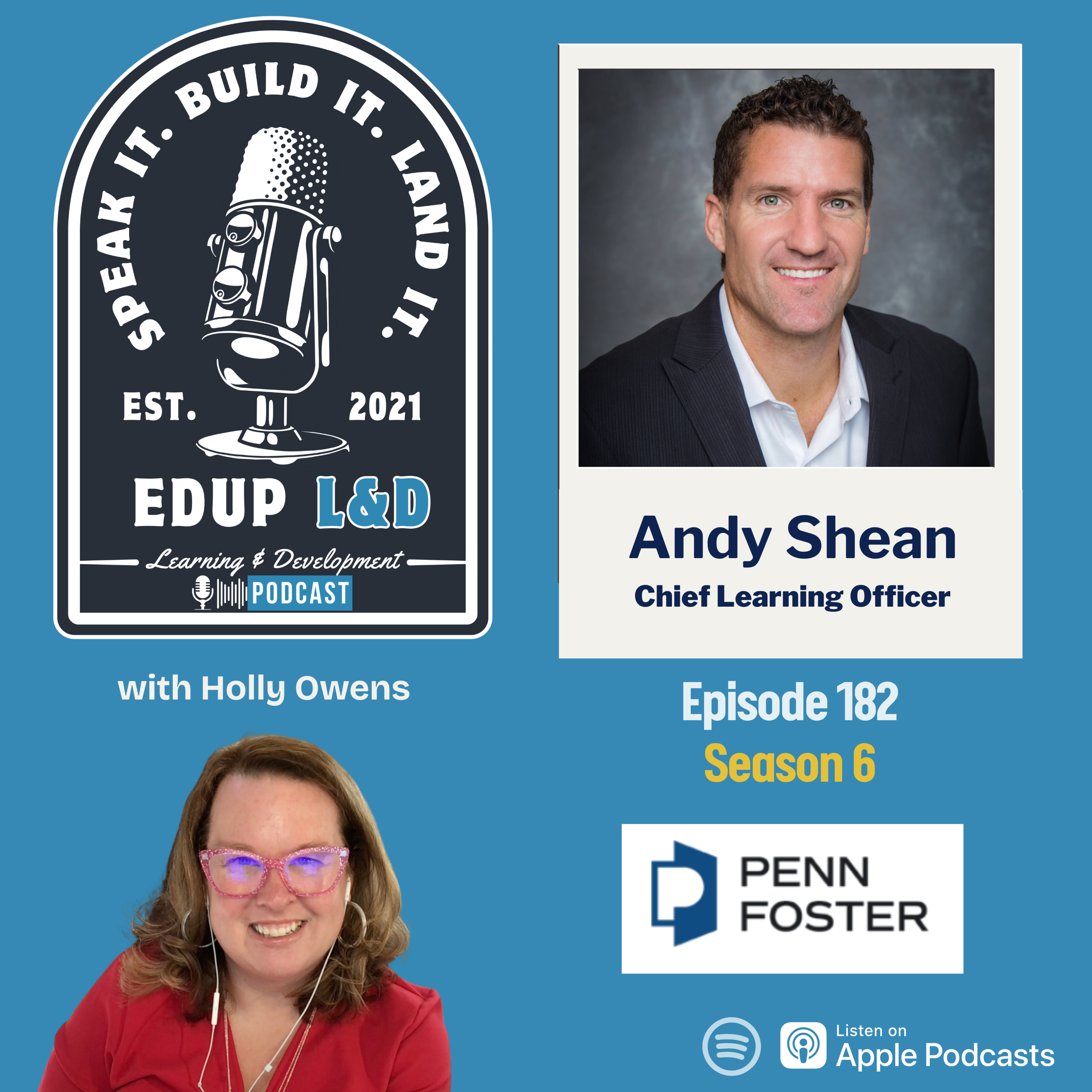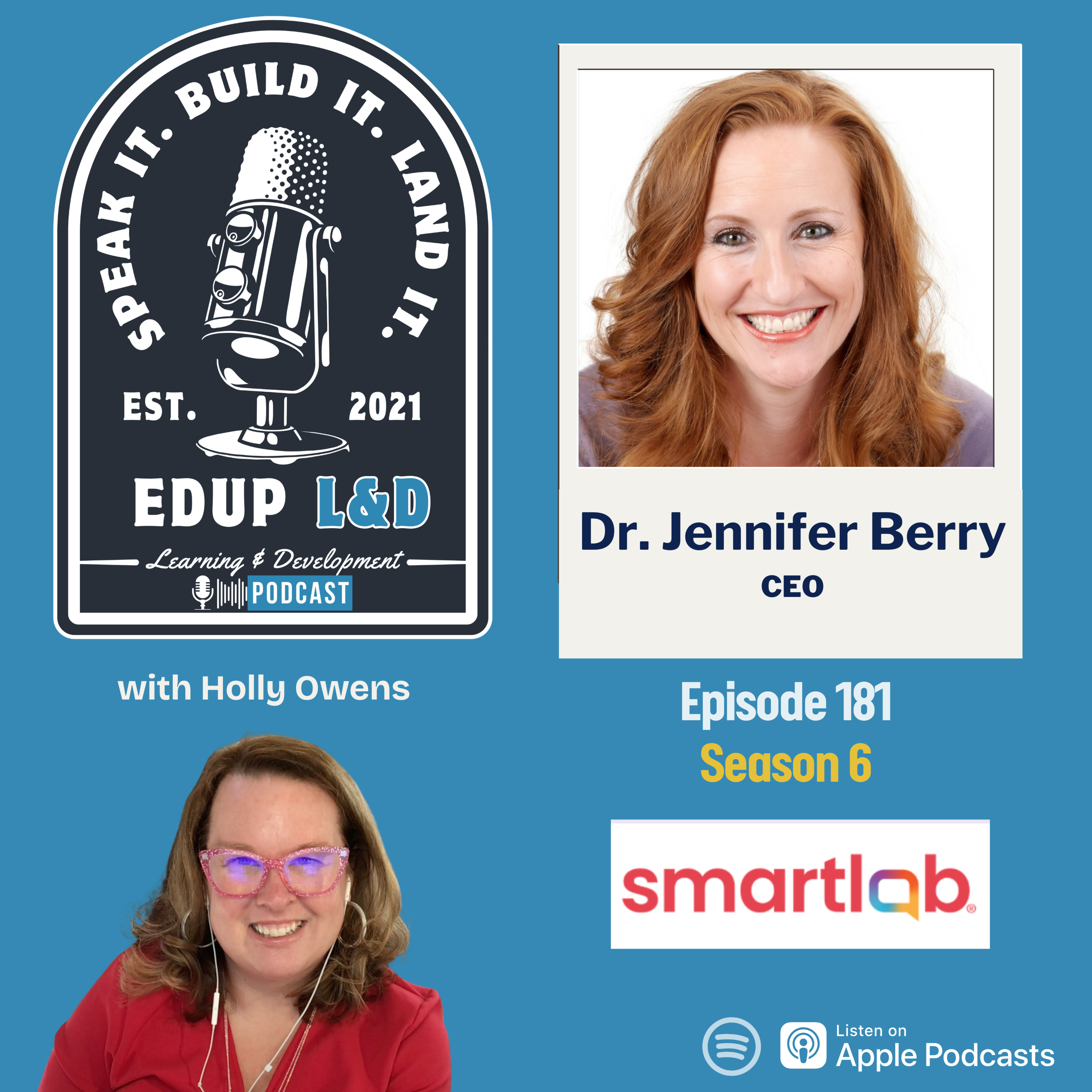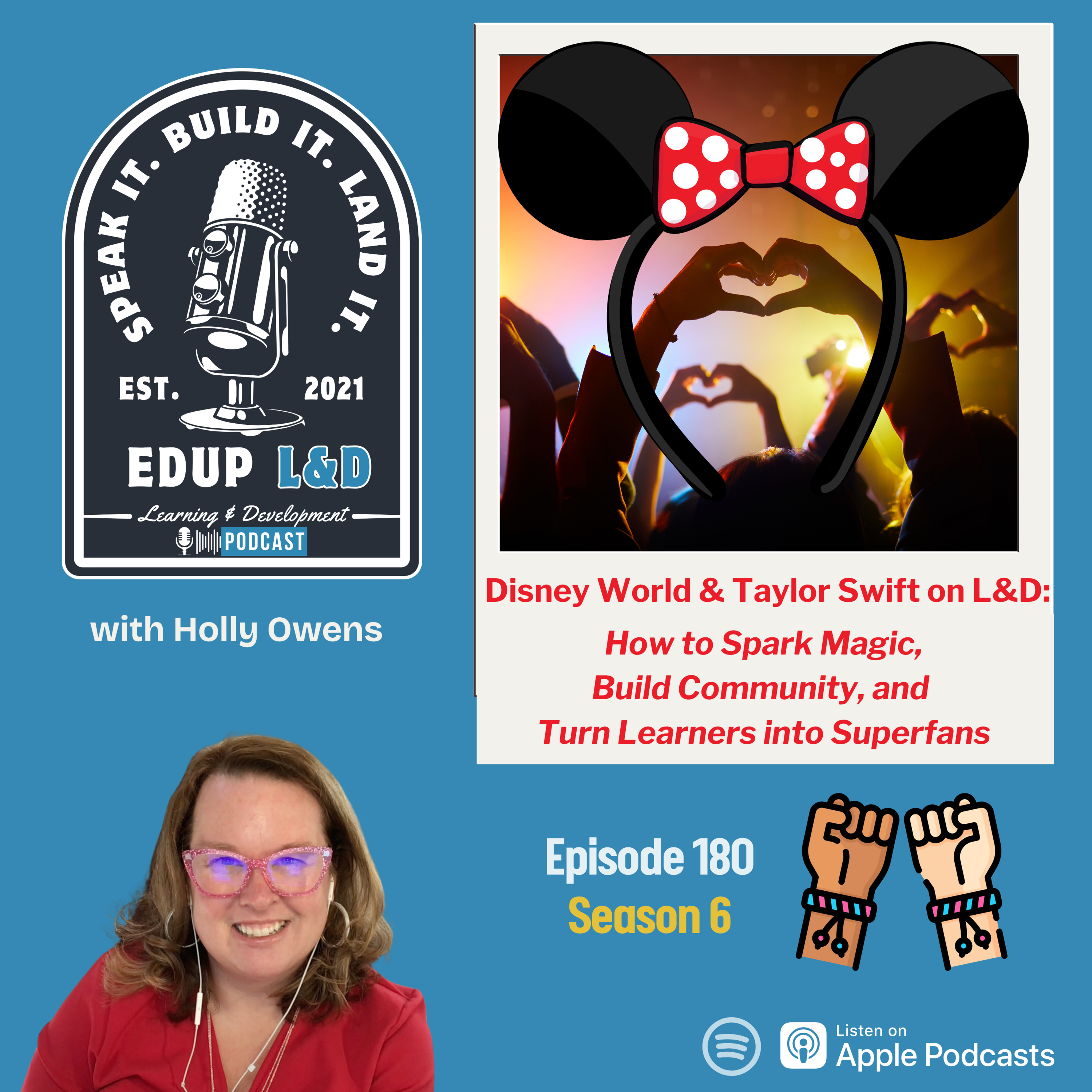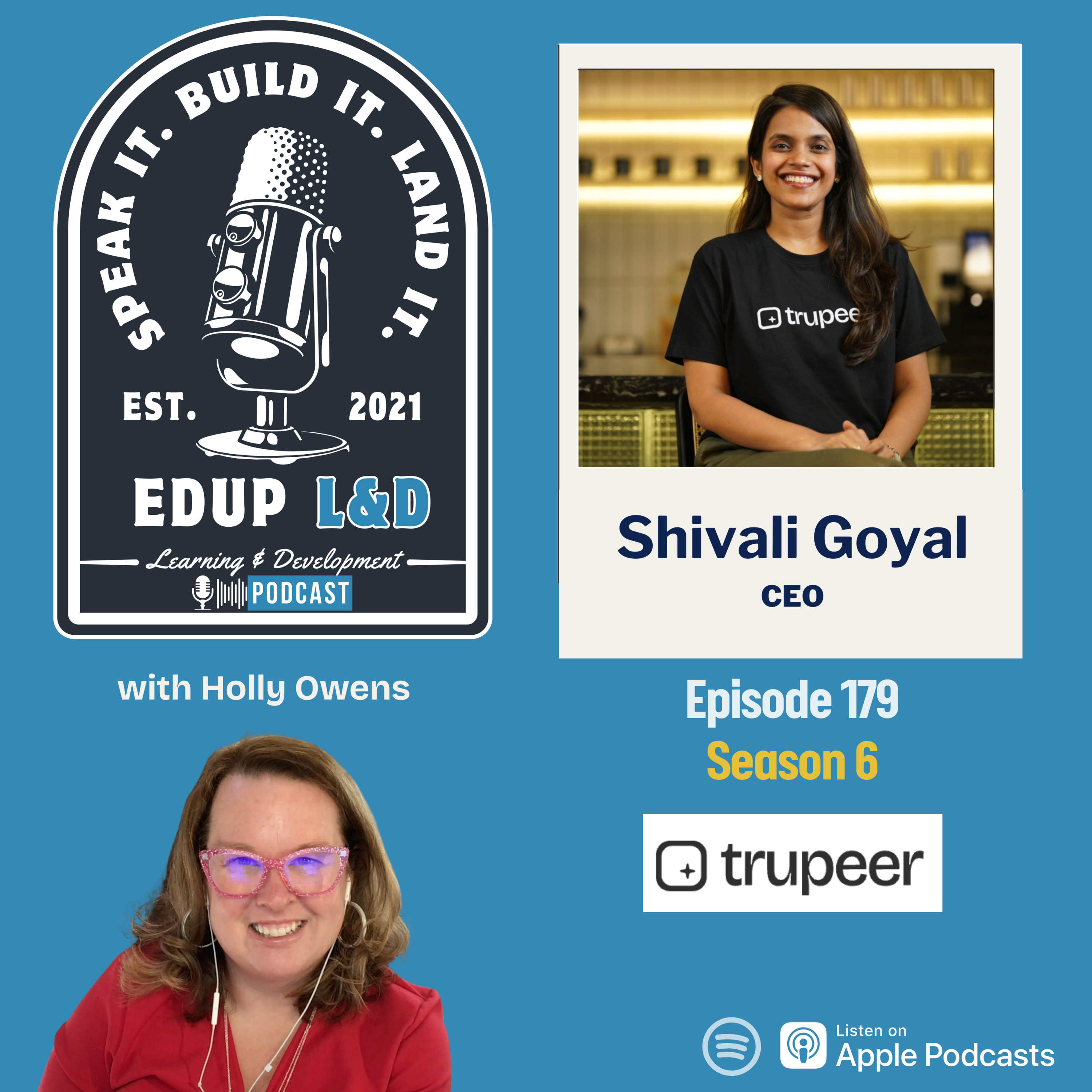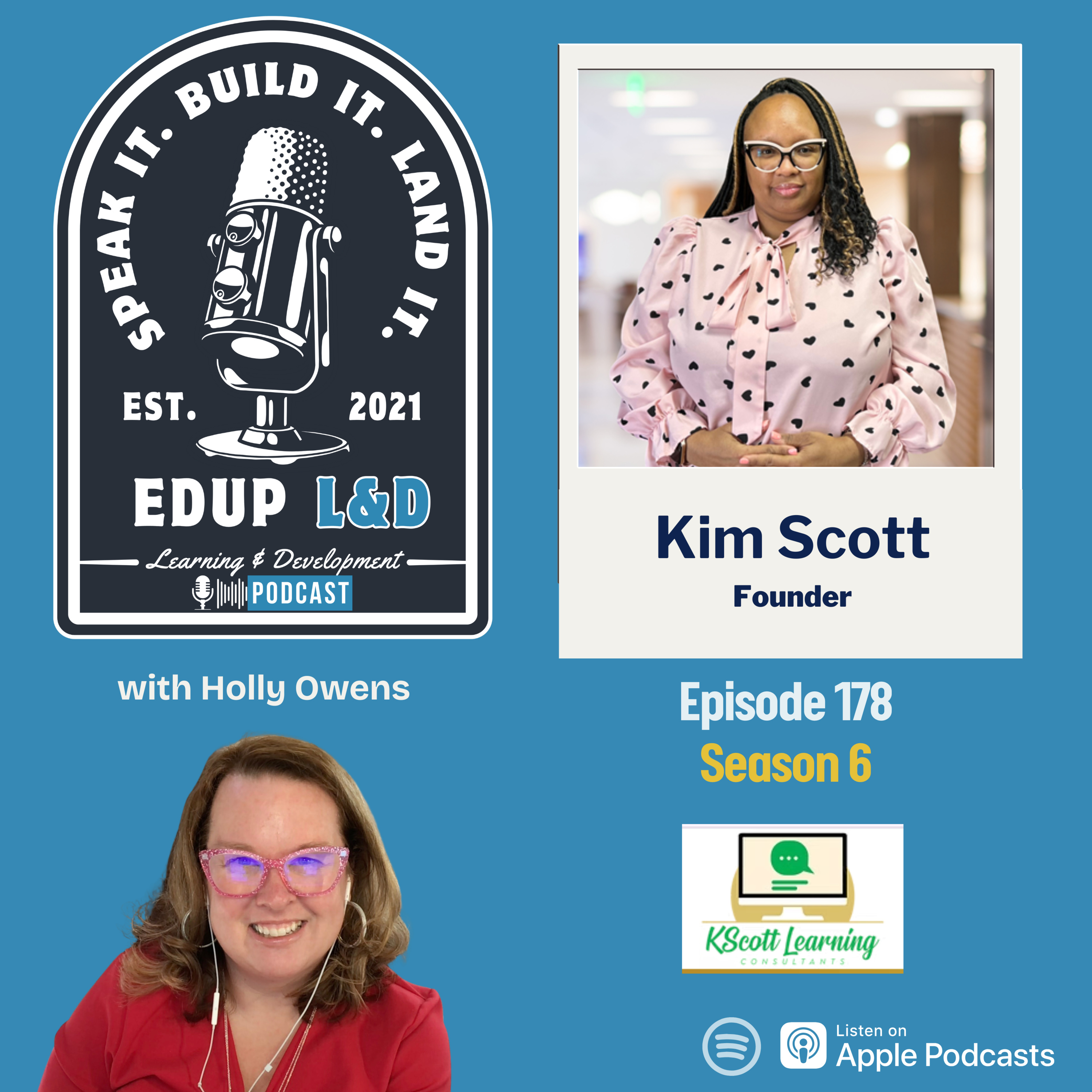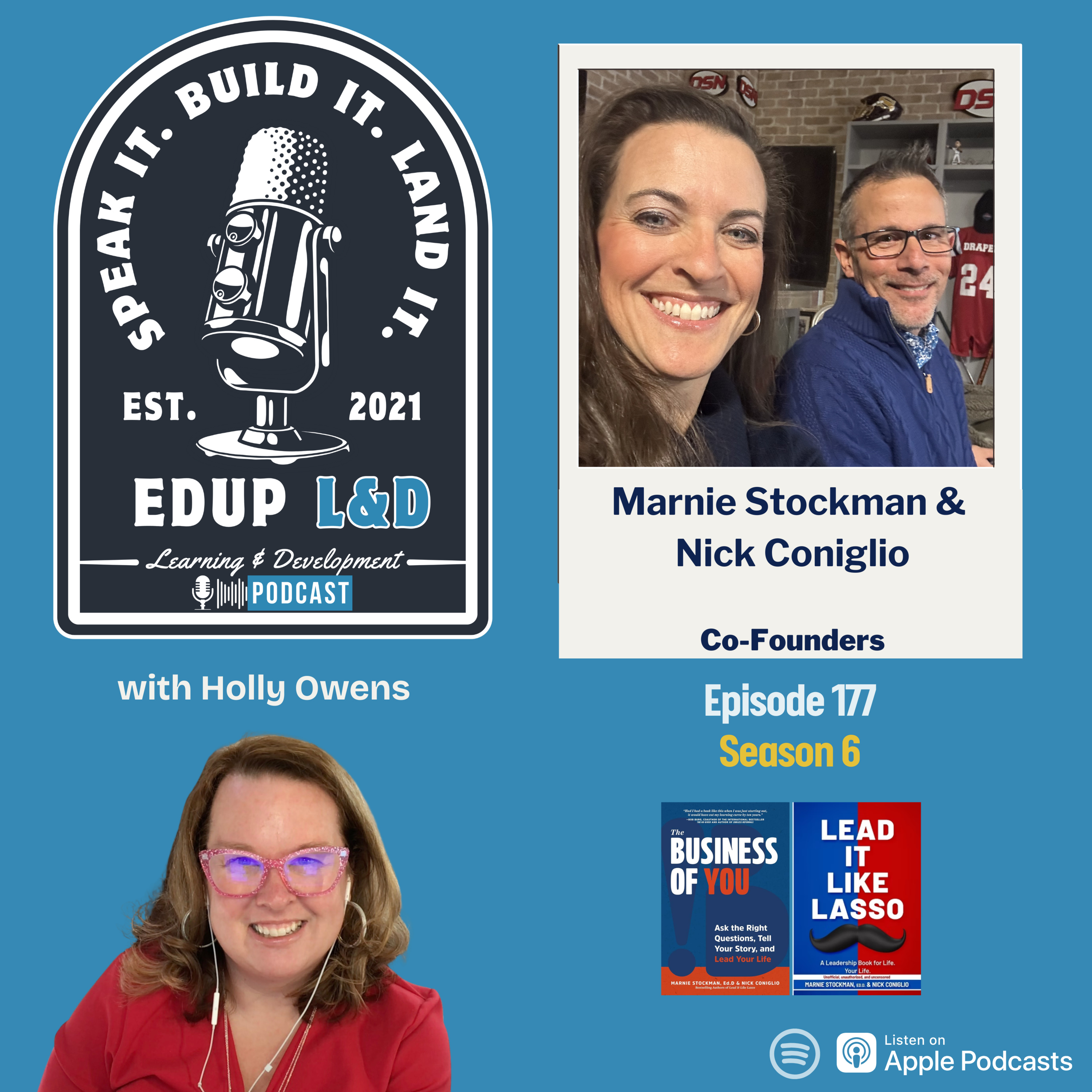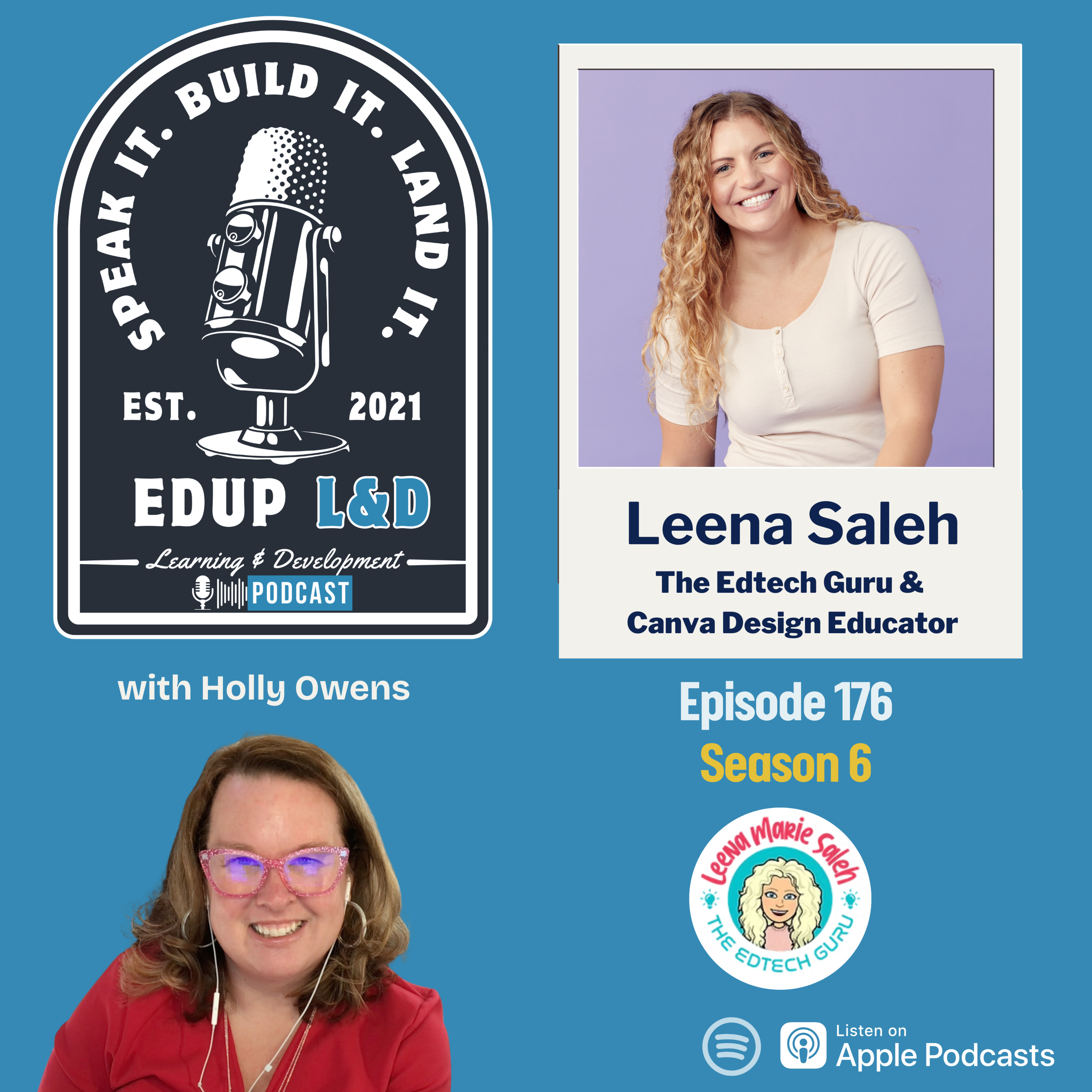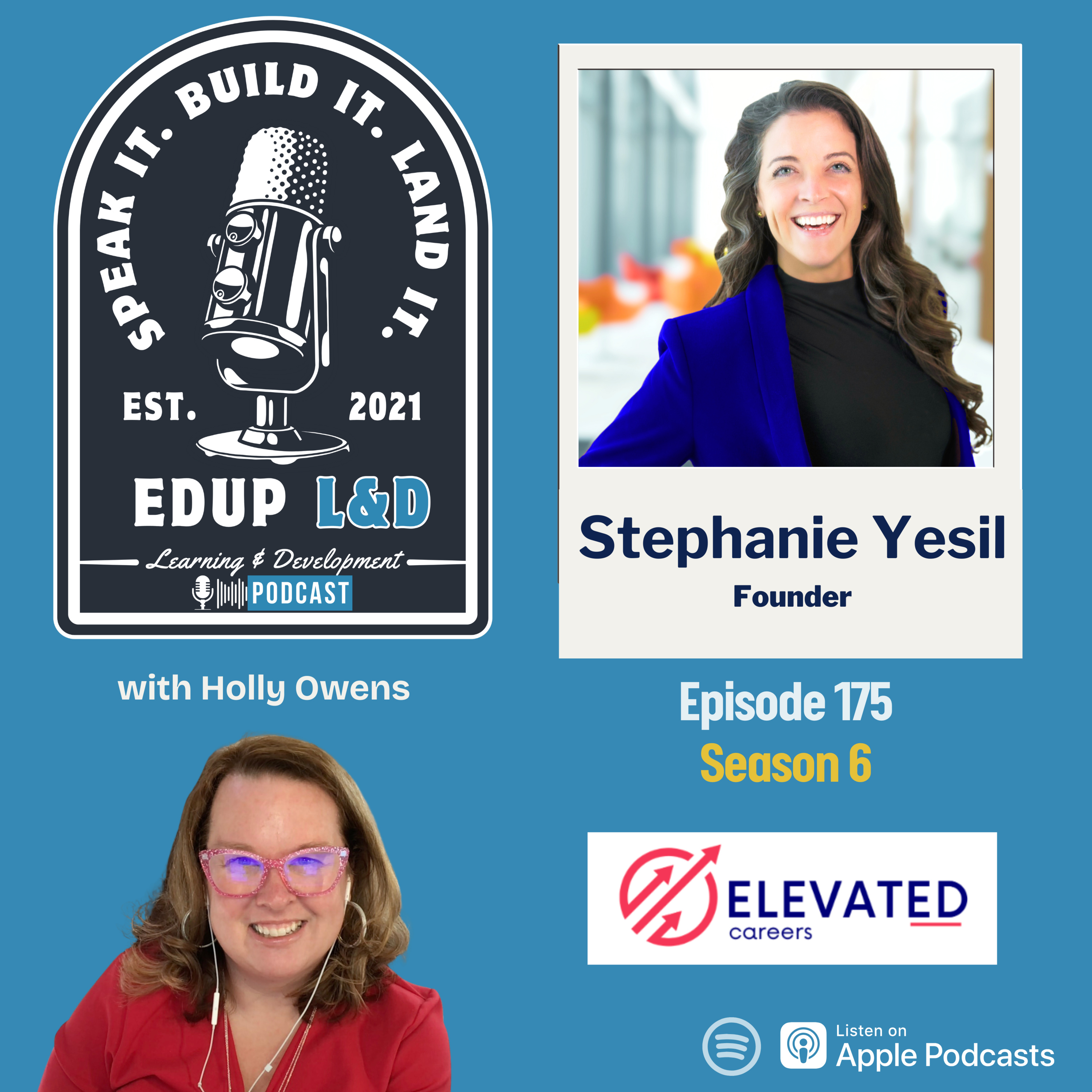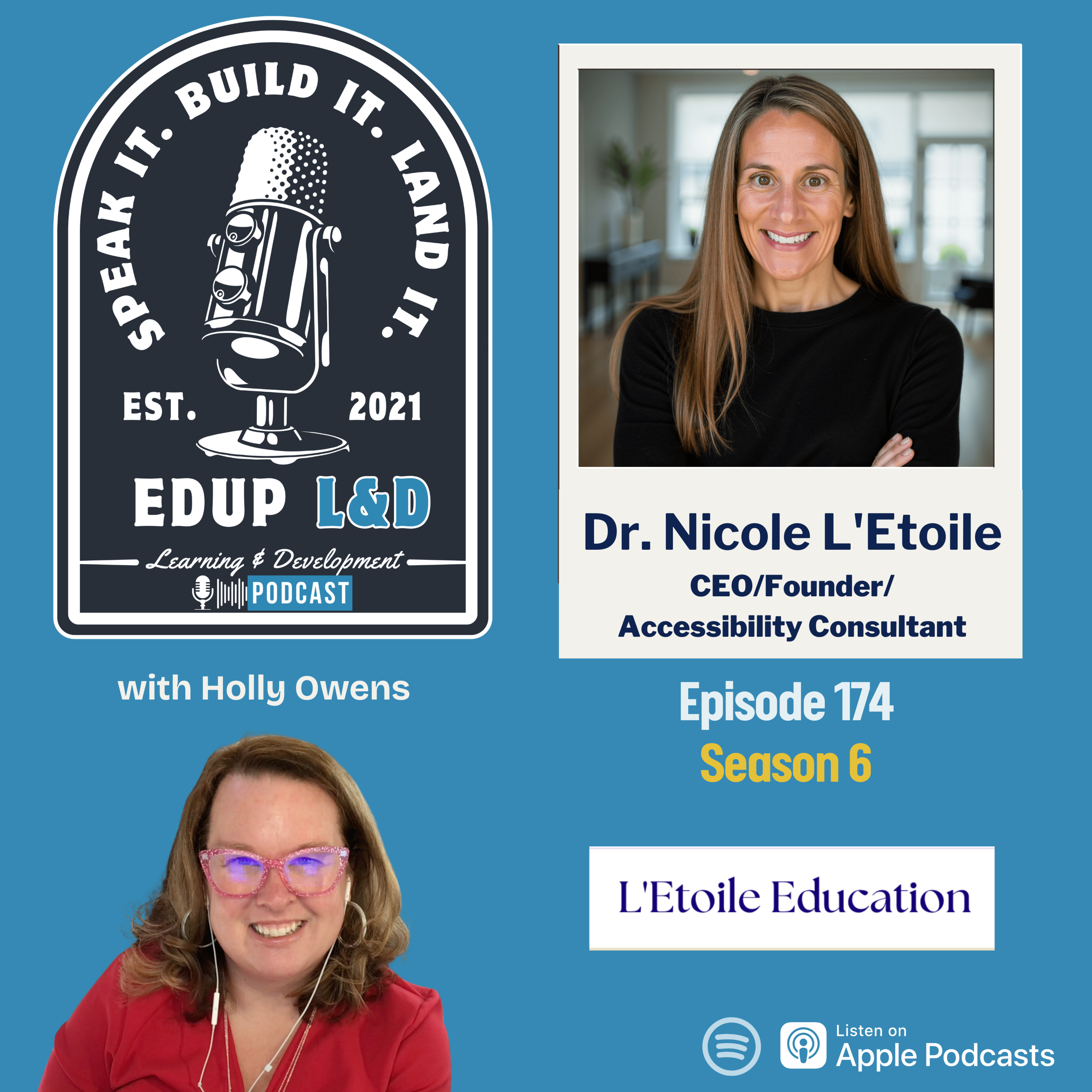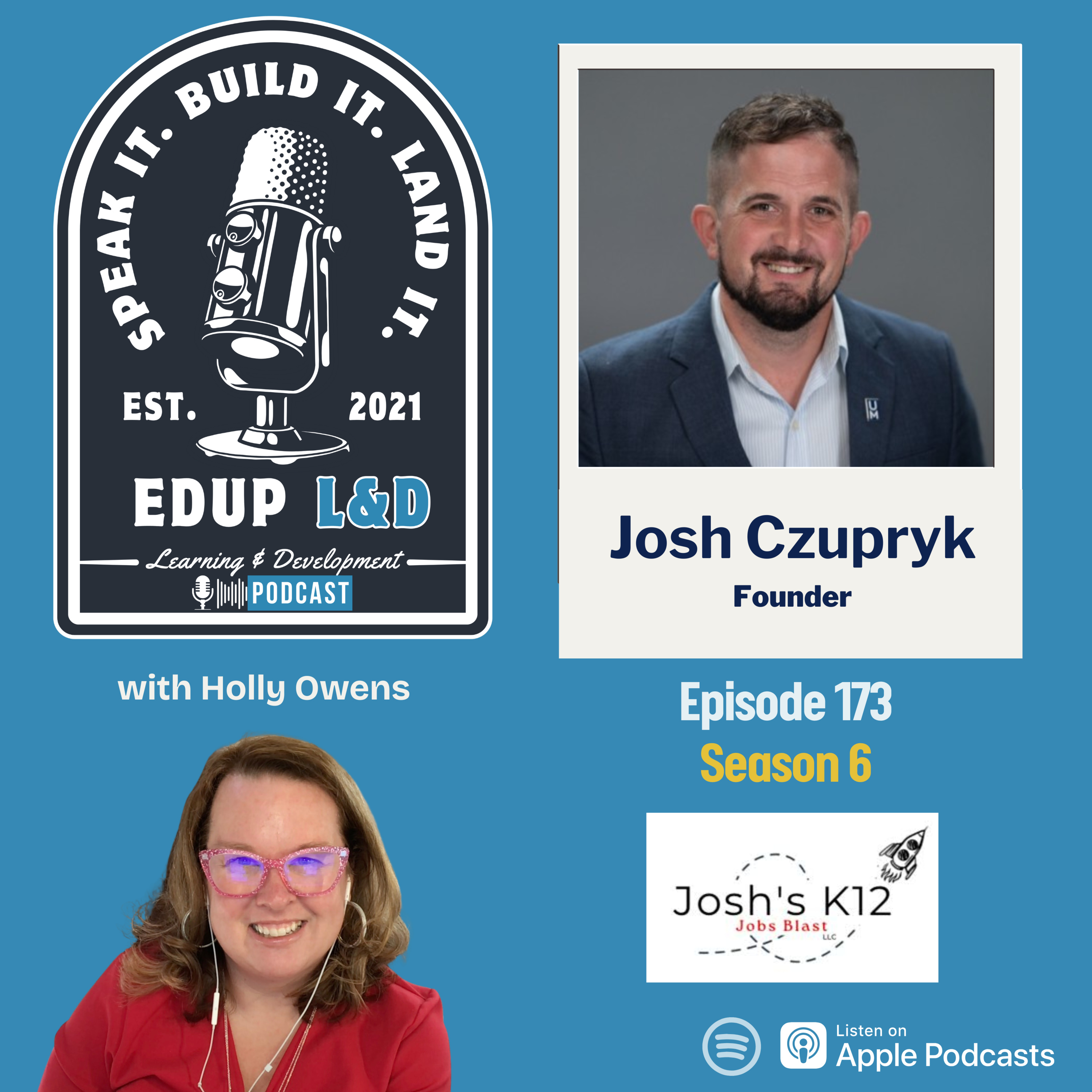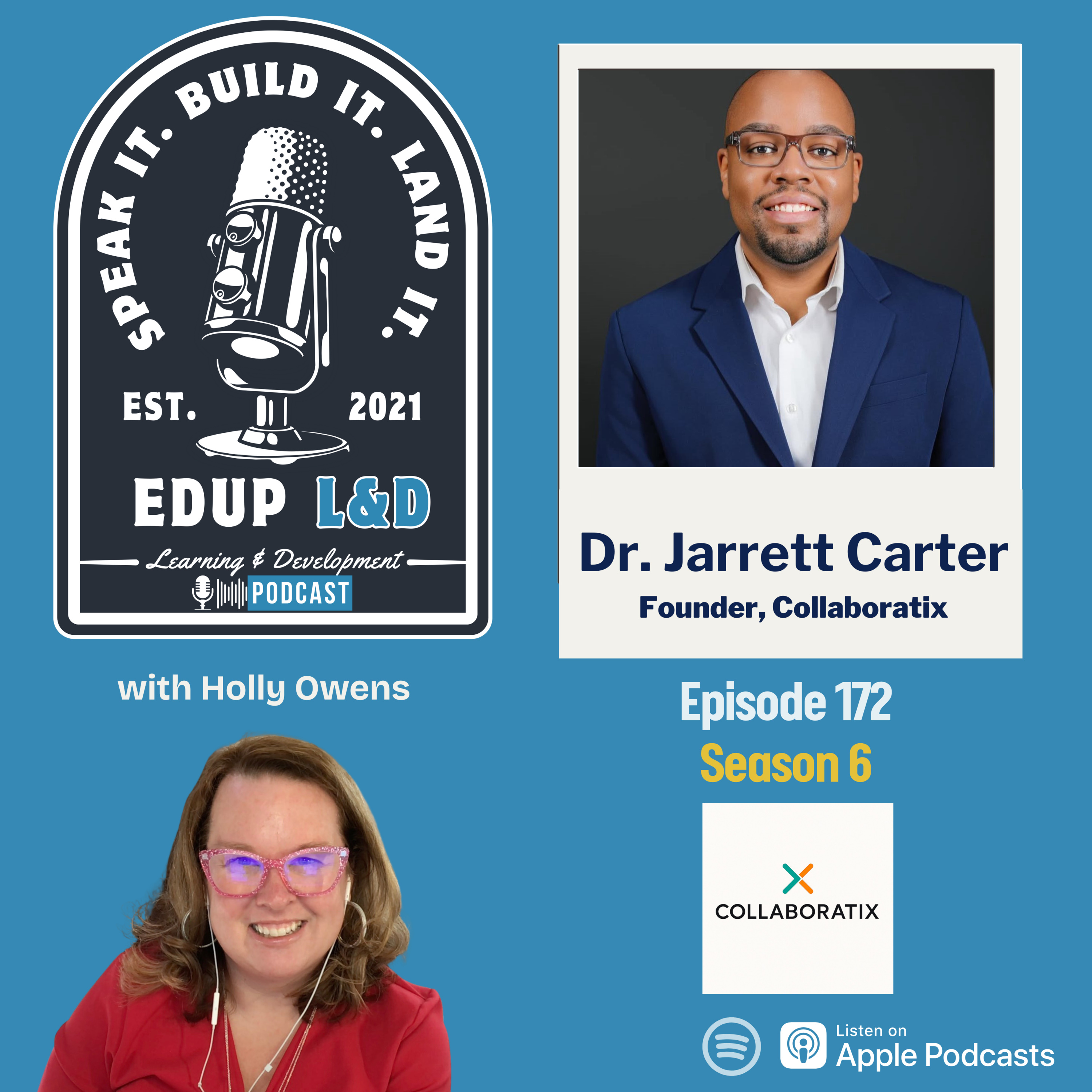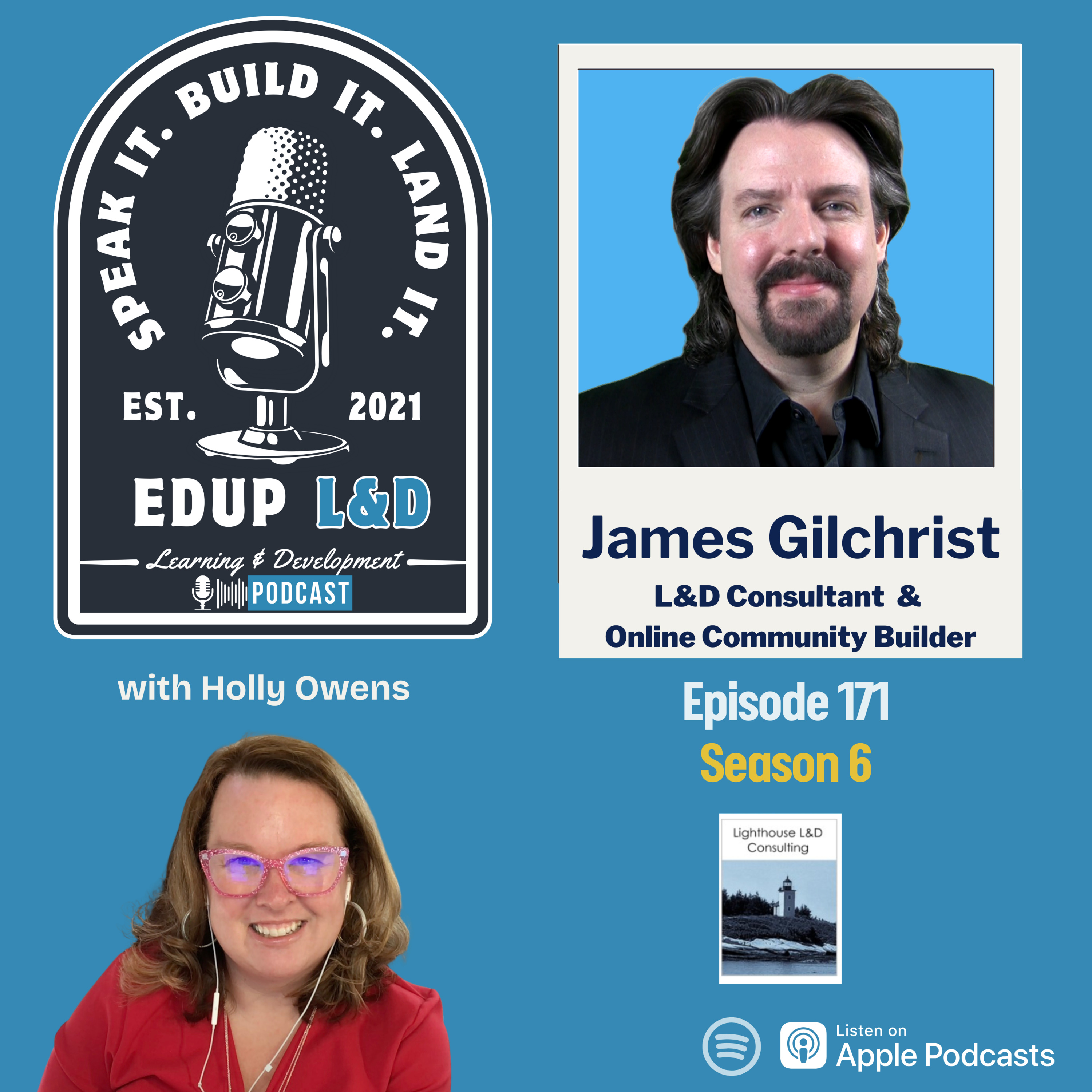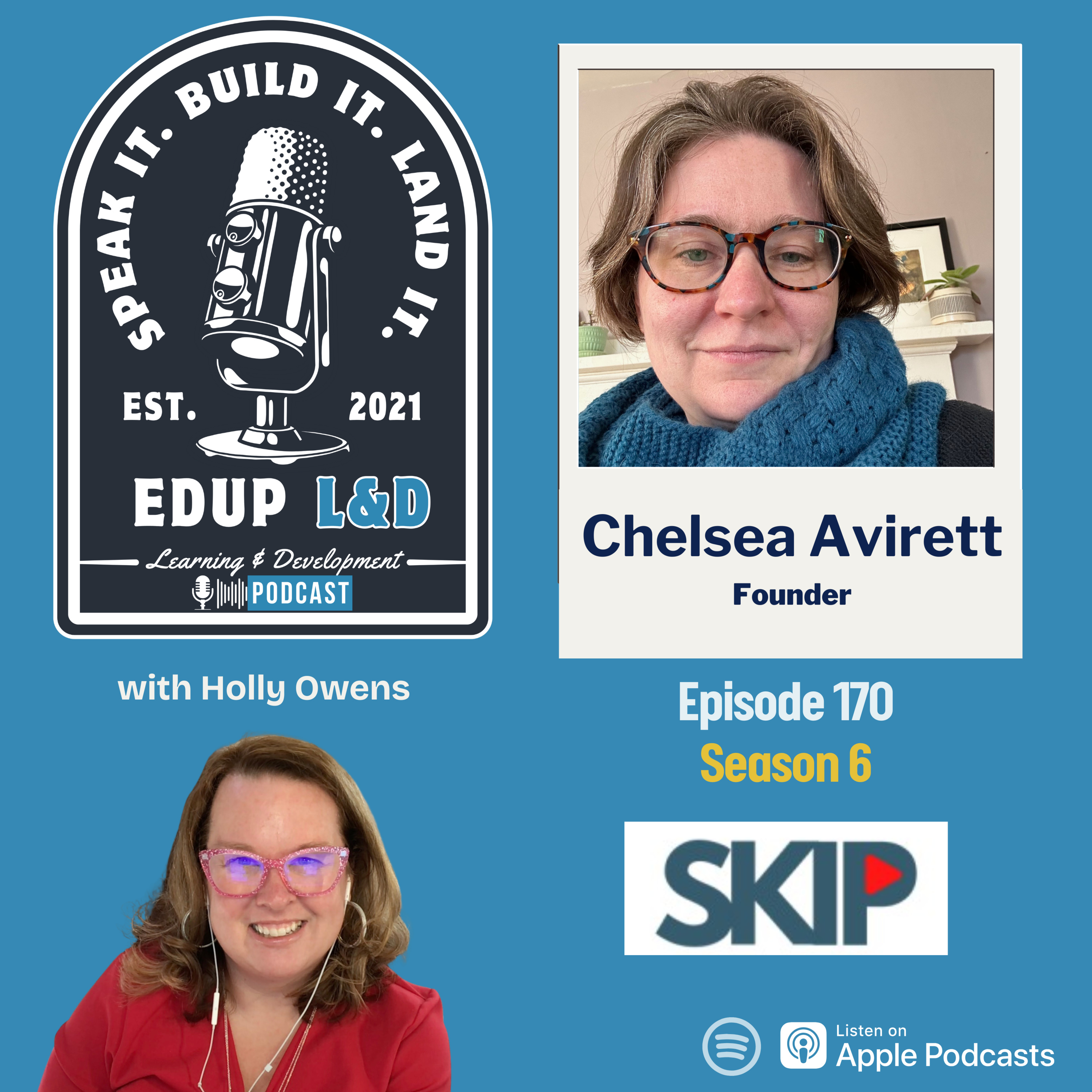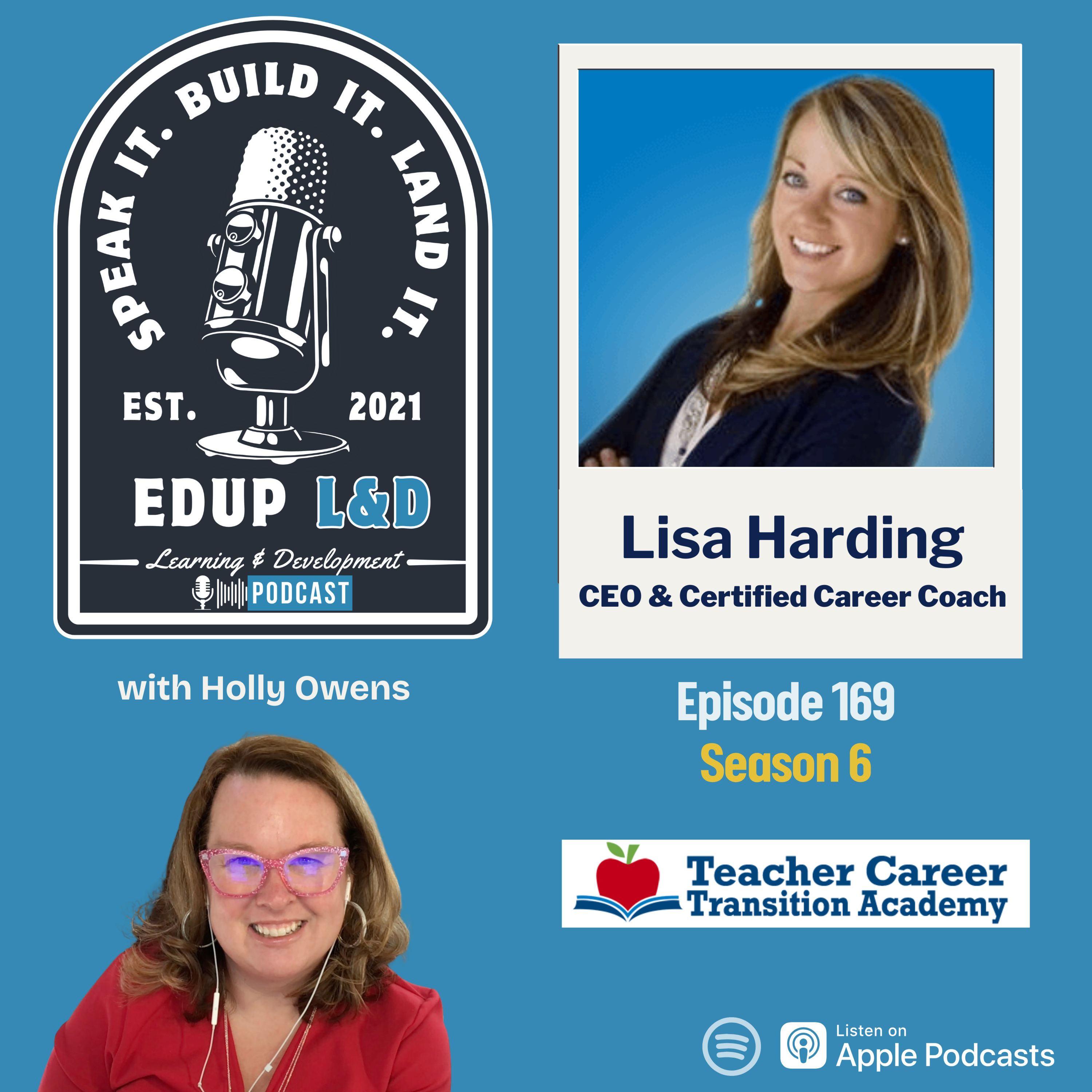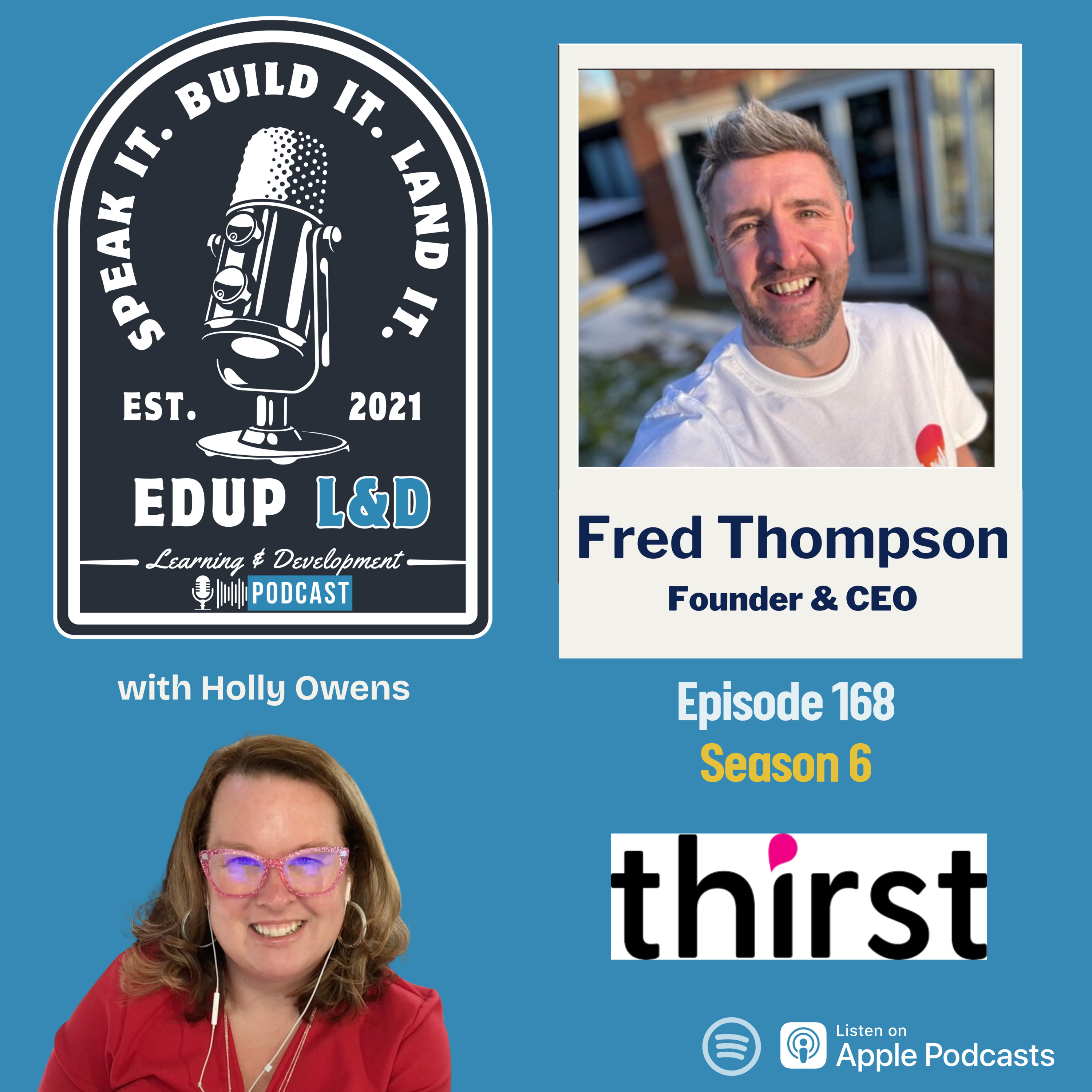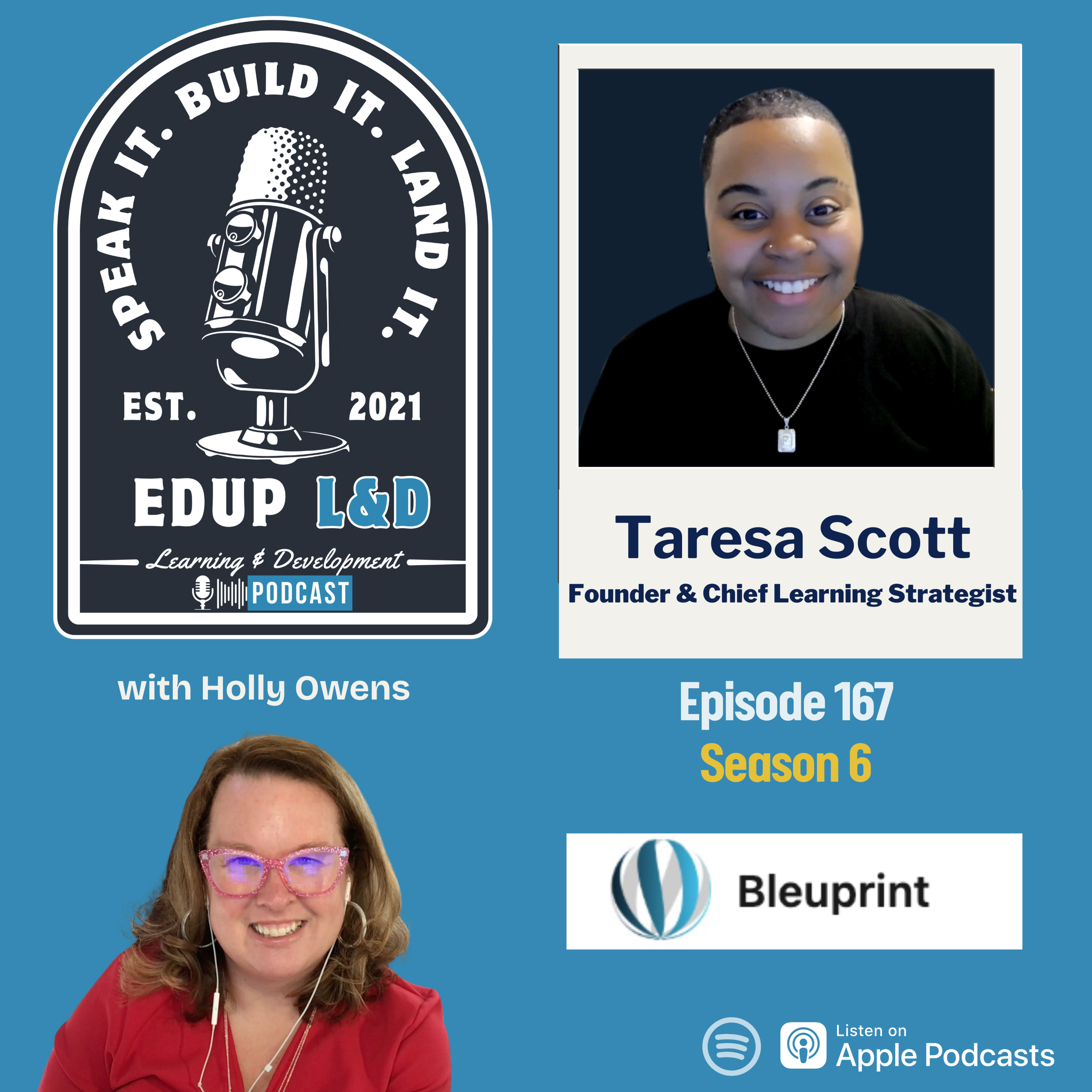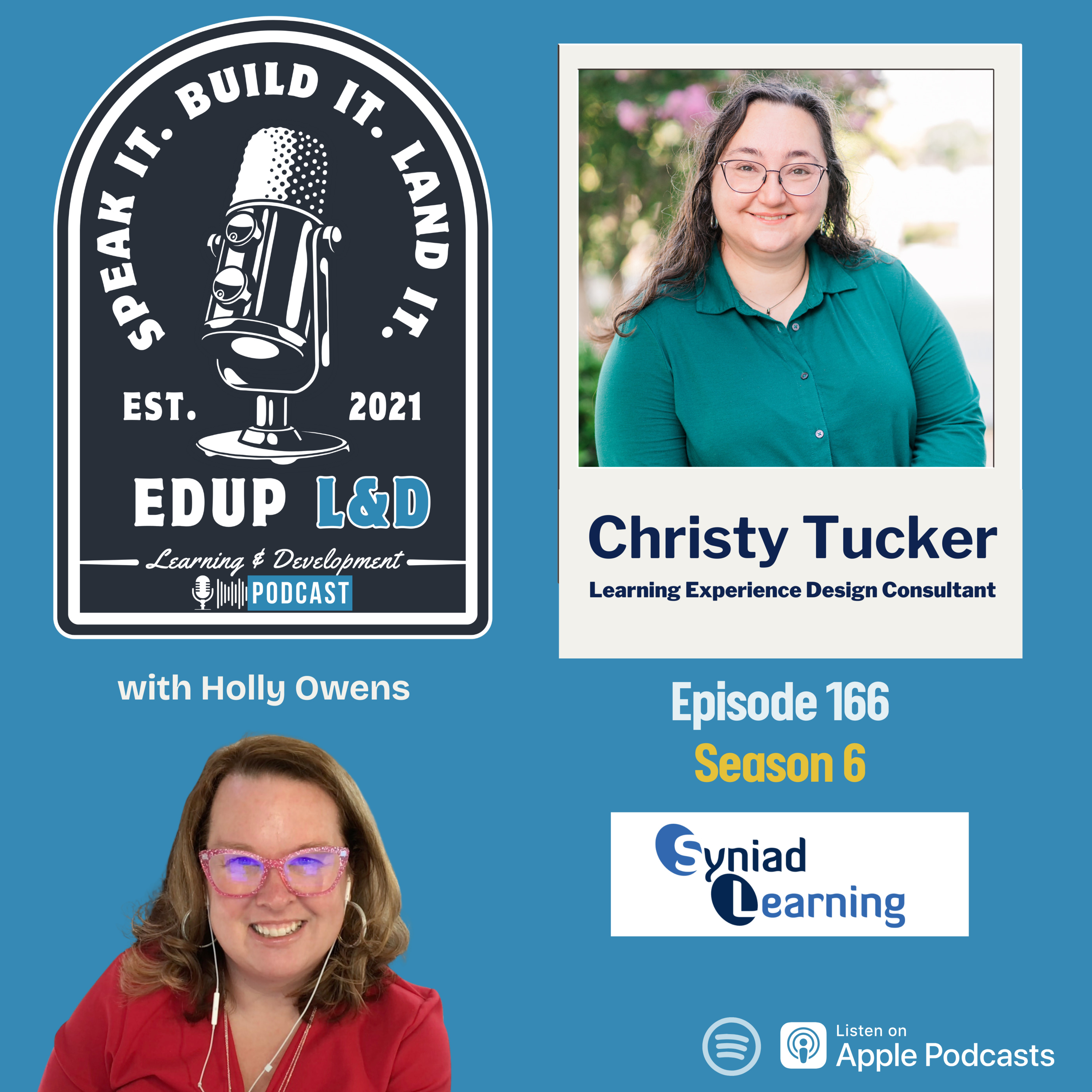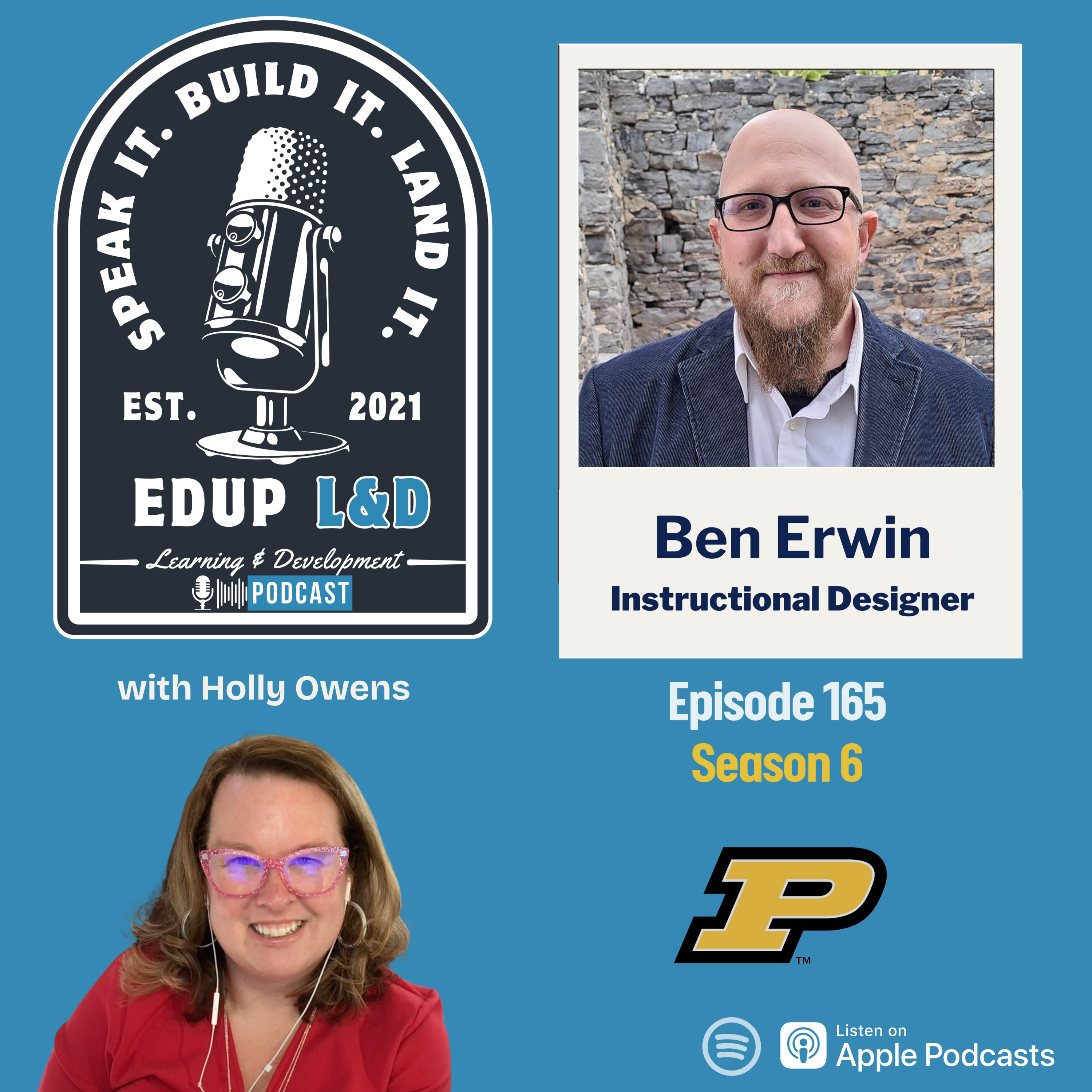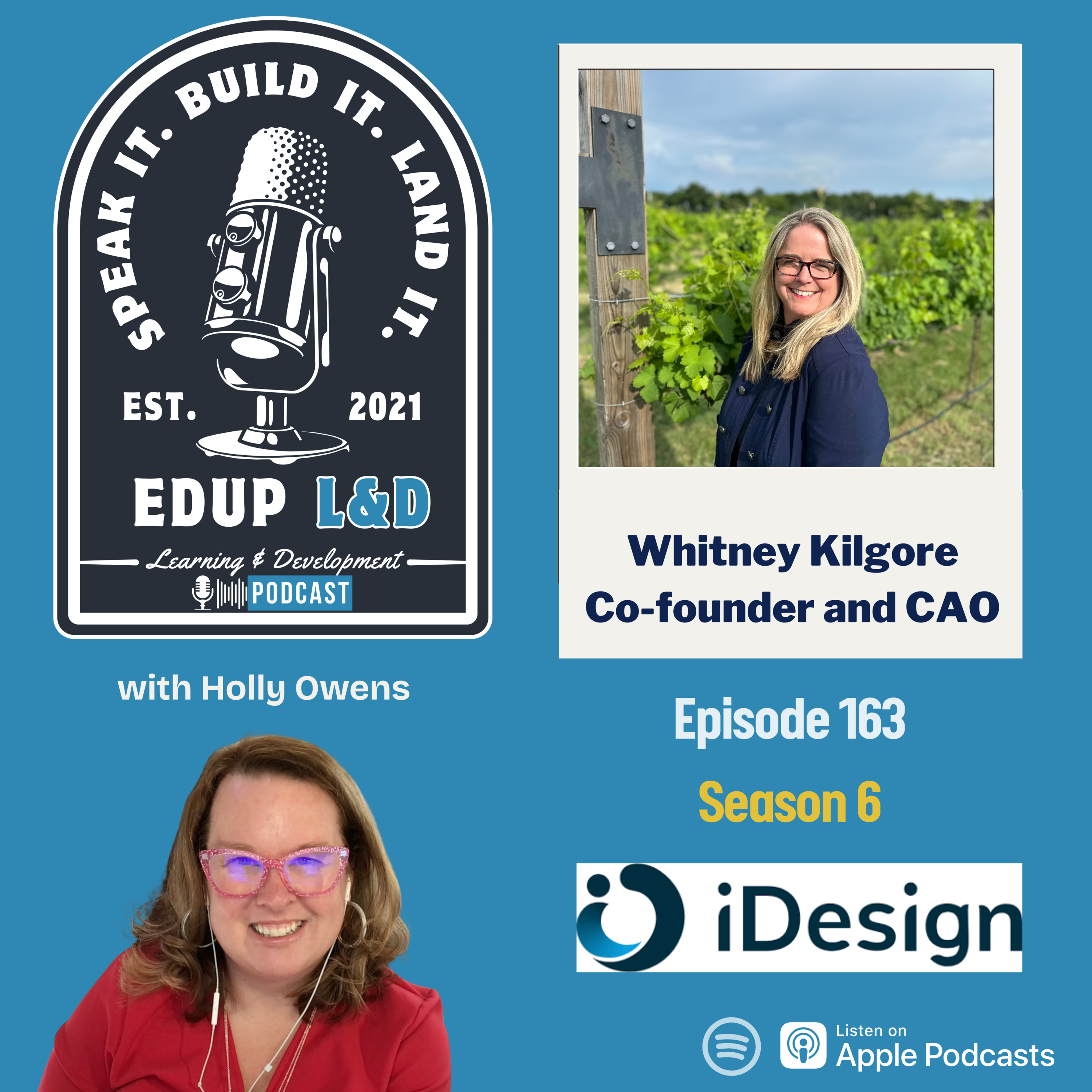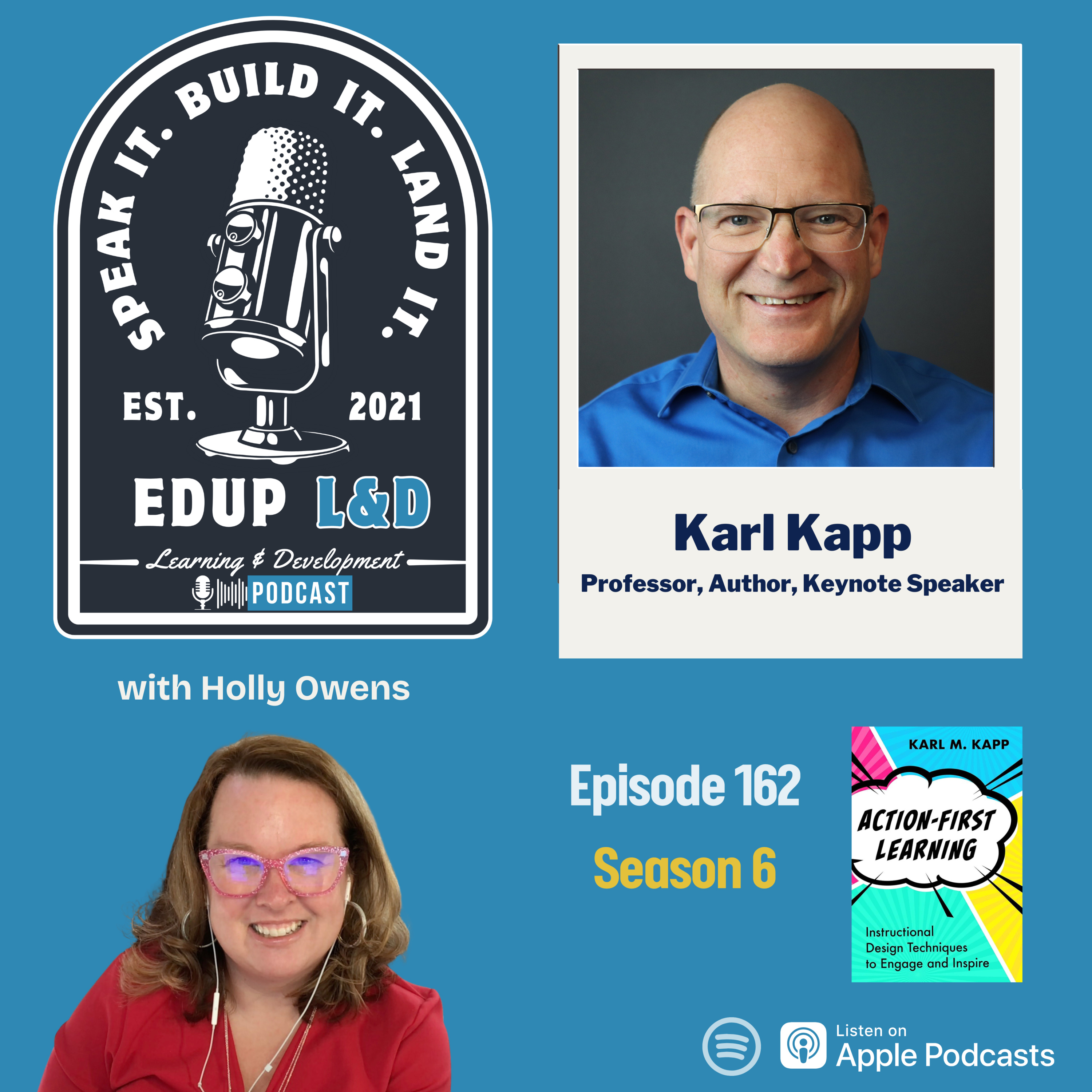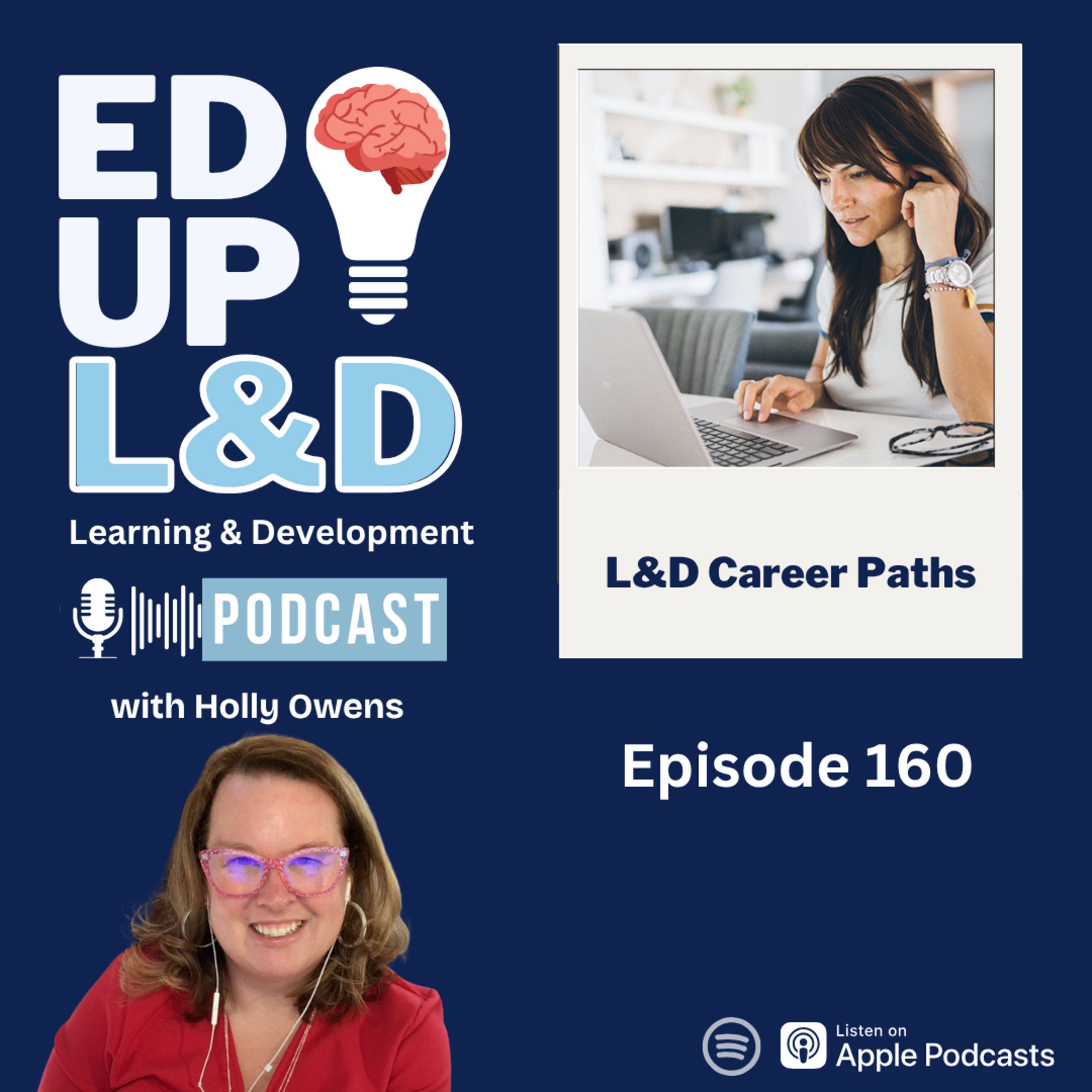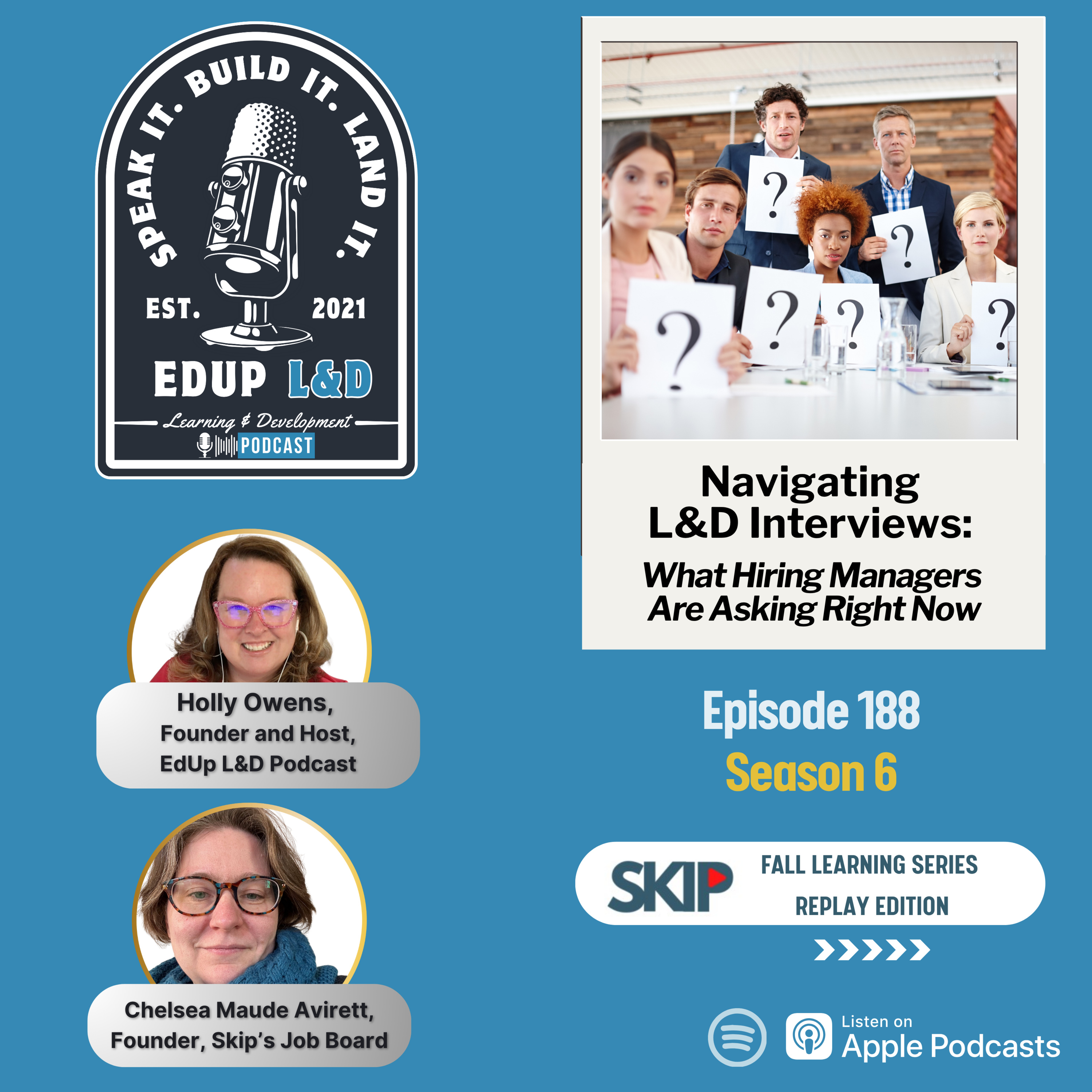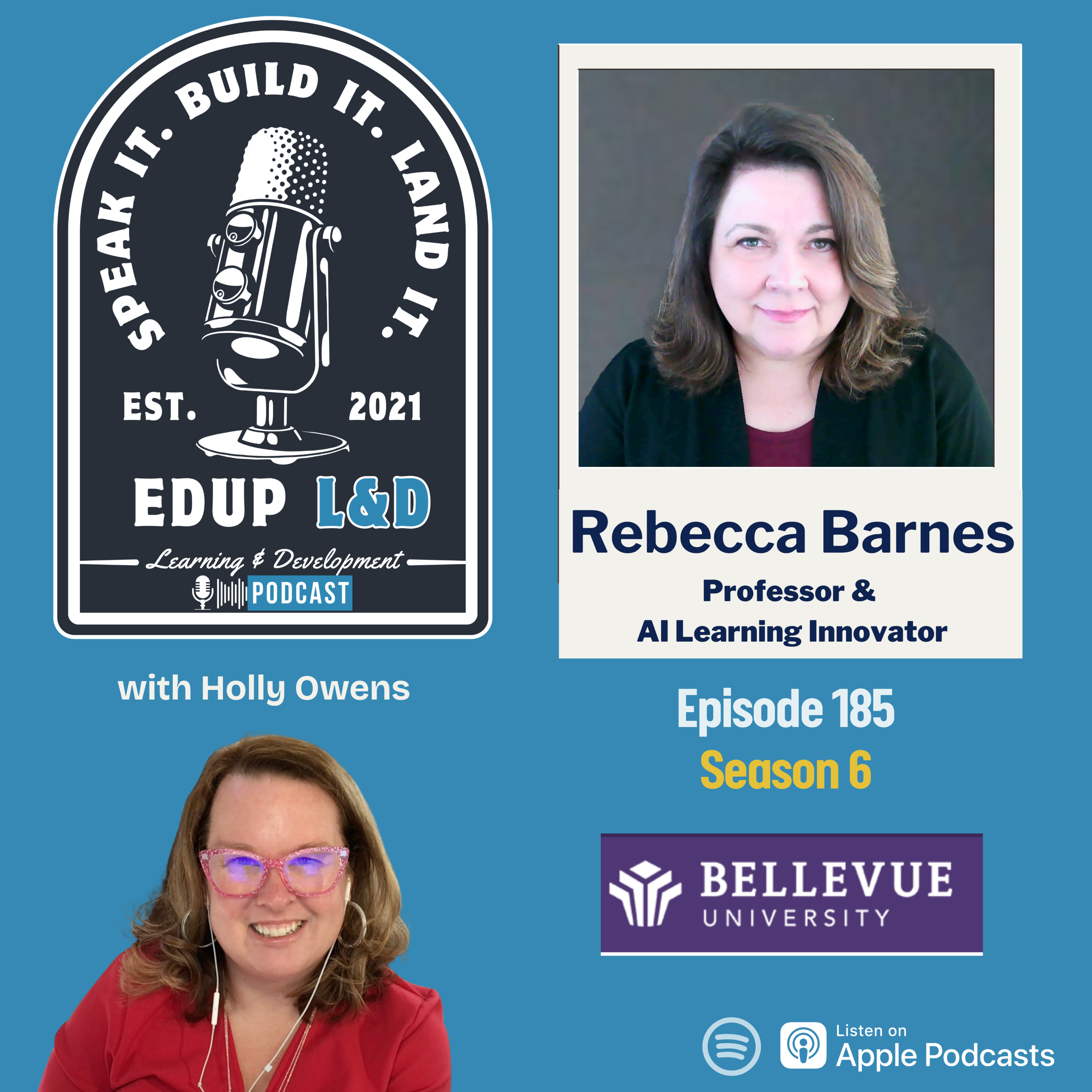
In this episode of EdUp L&D, host Holly Owens speaks with Rebecca Barnes, the program director for the business management and leadership degree program at Bellevue University. They discuss Rebecca's transition from a business background to education, the integration of AI in learning, and the unique needs of adult learners. The conversation highlights the importance of flexibility in education, the use of technology and tools, and the power of storytelling in making learning engaging. Rebecca also shares insights on innovative learning approaches and offers advice for aspiring educators.
In this episode of EdUp L&D, host Holly Owens speaks with Rebecca Barnes, the program director for the business management and leadership degree program at Bellevue University. They discuss Rebecca's transition from a business background to education, the integration of AI in learning, and the unique needs of adult learners. The conversation highlights the importance of flexibility in education, the use of technology and tools, and the power of storytelling in making learning engaging. Rebecca also shares insights on innovative learning approaches and offers advice for aspiring educators.
Guest Contact Information:
Connect with Holly + Access Her Resources:
Grab your official EdUp L&D merch here:
___________________________________
Episode Sponsor: iSpring Solutions
🎙️ Huge thanks to our friends at iSpring Solutions for sponsoring this episode of the EdUp L&D podcast! 🙌
If you haven’t already, be sure to check out the iSpring Learning Exchange Community — a vibrant space for creators, educators, and L&D pros to connect and grow.
Grateful for the support and excited to see what our community creates 💡
Thanks for tuning in! 🎧
Holly Owens (00:00.974)
Hello everyone and welcome to another fabulous episode of EdUp L &D. My name is Holly Owens and I'm your host. And again, I'm super excited every time I have a new guest on the show. And today I have another new guest. have Rebecca Barnes here. Rebecca, welcome on in to EdUp L &D.
Rebecca Barnes (00:20.282)
Thank you, Holly. Glad to be here.
Holly Owens (00:22.606)
I'm really excited. I'm not gonna, you know, share your story. I want you to be able to share that with our audience. We're gonna talk about a lot of different things in this episode. So if you're a higher ed fan and you're a business fan, this is definitely gonna be an episode for you. So Rebecca, why don't you tell us a little bit about how your background and how you move from the world of business into education and learning.
Rebecca Barnes (00:45.136)
Sure. You know, my background is in project management, customer experience, consulting, and finance. And over time, I realized the parts I loved most were the moments where I was helping people learn and succeed. So in fact, at one time, a company had sent us, we were in a leadership class. And I'm sitting in that class and I thought, wow, I would really like to be doing this all the time.
Holly Owens (01:05.73)
Yeah.
Holly Owens (01:13.031)
Ha
Rebecca Barnes (01:13.254)
Well, it is kind of one of those things you're always thinking, oh, maybe that'll be my retirement job. And then I had an opportunity to start teaching as an adjunct. And I was like, oh, this is really fun. This is cool. You go to your day job, and this is what you did for fun. Yeah, I know, a second job is what I do for fun. But that's not uncommon. And I really fell in love with it.
Holly Owens (01:33.231)
I love it. It's not. It's really not.
Rebecca Barnes (01:39.312)
So now I get to merge business know-how with learning design. I was always kind of a, I'm not a technical person. I was in project management. So I used to tell my grandmother how I explained my job was I was a techie to normal person translator. So.
Holly Owens (01:57.046)
Yes, that is a great I've never heard it explained that way. That's a great way to explain it because I always used to say like very complex topics make it very simple.
Rebecca Barnes (02:07.608)
Exactly, and being able to both talk to the tech folks about what you're trying to create, and to the end user about what they're needing, and try to come up with the product that's actually going to solve the problem you're trying to solve. So now I really see my role as helping both students and instructors thrive in this fast-changing world, and how do we use EdTech to make education and the learning process better.
Holly Owens (02:37.652)
Absolutely. Well, tell us a little bit about your role at Bellevue, like as the program director, like what are some of the things, you know, I'm always fascinated by like, you've you started out as an adjunct, you're still teaching in the program, you're now the program director. So how what does that look like? What does that all entail in the day to day?
Rebecca Barnes (02:55.91)
Sure. So I'm the program director for the business management and leadership degree program at Bellevue University. Our students are online. They're working adults. They're balancing jobs, families, and schools. So my focus is really on making the learning applied, relevant, and usable. They want it to be something they can actually go into work the next day and use what they just learned.
Holly Owens (03:20.596)
Love that. Yes, completely applicable.
Rebecca Barnes (03:23.972)
And I also work on weaving emerging technologies like AI into the curriculum in ways that empower students rather than overwhelm them. We're all kind of feeling our way around this. I had a colleague who just, and this was just a few weeks ago, she's like, do you realize that Chad GPT has just been out for a thousand days? And so we're really living this disruptive technology and
Holly Owens (03:34.913)
You
Holly Owens (03:44.908)
Yeah. my God.
Rebecca Barnes (03:54.042)
you know, in the classroom and when we go out and talk to employers, they're very clear that they expect our graduates to come out and help them figure out what they're doing with AI. So making sure that we're covering that in the classroom and staying up to date is really important.
Holly Owens (04:12.332)
That's great. And you know what's so funny is like, AI is literally everywhere now. went like yesterday, my electric toothbrush went kaput. OK, so I'm on Amazon or I'm doing like a what's the world be versus Sonicare or whatever. what pops up is an electric toothbrush with built in AI to tell you where to. I know I know.
So I'm like, this is like, you know, that's like next level to me. Like it's it's integrated into that sort of technology. Like I know there's generative AI. I know there's things behind the scenes that are kind of helping us write stuff or prompting. But I saw that I was like, this is absolutely insane that this is already happening because, you know, I imagine a world five, 10 years from now where everything is integrated with AI and it's just something that we use every day and we don't really notice it.
Rebecca Barnes (05:07.458)
I think so too. I really try to talk to students too about, the saying is, history doesn't repeat itself, but it echoes. And when we talk about disruptive technologies, and I think that's what we're living with right now, like you know what, folks, I don't like to admit it, but I'm old enough to remember when people use typewriters instead of computers.
Holly Owens (05:18.307)
Yeah.
Rebecca Barnes (05:33.27)
So then you've got the personal computer was a very disruptive technology for business. And you thought, well, this is going to be it. This is the one for my lifetime. luckily, I started off in school learning computers. So we kind of came out and already were ready for that. And then the cell phone came out. And I don't think people really realized how much that was going to integrate into our lives.
Holly Owens (05:50.348)
Yeah.
Holly Owens (06:00.951)
I know.
Rebecca Barnes (06:01.08)
And now you can't log into your computer without your phone.
Holly Owens (06:03.79)
Right, you can't log into anything without your phone. You need to text message, you have to do passcode, have to do face stuff. It's absolutely, it's so different. I grew up in an analog world as well. just like, you know, I remember getting our first computer at about 10 years old and we had rented it from Gateway. My grandmother, you know, she was all about, she made my sister and myself in high school take keyboarding. It was called keyboarding, not computers or whatever they call it now. So I'm so glad she did that because I can type really well.
But yeah, definitely the switch from analog to digital. And people say things, you know, at first there's people like they're very much resistant to the fact that something is changing. And then now we don't even notice it anymore. So I think, I don't know if you feel the same way, but I think that's going to be something that where that AI is going to, that's going to happen with AI with people as well. They're just not going to be like, no, we can't use AI. No, it's bad. It's going to replace human jobs and things like that.
Rebecca Barnes (07:01.19)
Oh no, I think we're very much going to be in a human in the loop world with AI. I'm laughing over your keyboarding because they made us take a actual typing class on a typewriter. And then the next semester we had to take a class typing on the computer. And unfortunately for me, neither one took. I am not a good typist. But that is one of the things that I love about how much technology has moved.
Holly Owens (07:19.393)
Yeah.
Rebecca Barnes (07:30.286)
I'm typing away and I'm actually a great speller, terrible typist, and I'm watching my computer just go ahead and be like, yeah, I know what you meant. Here, let me fix that for you.
Holly Owens (07:38.19)
Exactly. It automatically knows. It knows exactly what you're thinking. It's really, really cool.
Rebecca Barnes (07:43.268)
Yes, 20 years ago, me and Whiteout were really good friends, but now no need. So, yeah, and that's a real change in how the world's going and how we have to be really deliberate in what we're doing and how we're approaching our education product. And in our program, we think a lot about how adults learn.
Holly Owens (07:46.99)
Yeah, yeah, absolutely.
Rebecca Barnes (08:11.15)
You know, andragogy is really different from pedagogy. Our students aren't kids. They're working adults. Like I mentioned, they've got families, jobs, experiences. They want their learning to be very relevant, applied, and respectful of their time. So we work real hard to design our courses to meet them where they are. And one of the things that we work on, and this is where AI is actually very helpful as well,
Holly Owens (08:27.341)
Yeah.
Rebecca Barnes (08:39.242)
is making the lessons as accessible as possible. you know, not everything in your course can be done on a phone or on a mobile device, but we do try to make mobile friendly options wherever we can. So that way a student, you know, you're on your 15 minute break at work, you can watch a video, you can complete a quick lesson, or, you know, the one I just had a student tell me, they're like, yeah.
So my kid had this full weekend soccer tournament, and I'm in the bleachers, got my iPad out, and they were able to do a lot of the lessons for the class right there. And I'm sure they were actually watching their child when they were playing. But when they're on the road, bring out the iPad. No one's going to judge.
Holly Owens (09:14.882)
Right.
Holly Owens (09:20.522)
Yeah, they're multitasking, right? Exactly. So you're, that's a good transition to the next question. Like you're, you know, you're working with an institution that serves thousands of adult learners and you've taught many of them. What are some, maybe, maybe some misconceptions or things that people don't know about adult learners? Like you had mentioned some things like they're, they want it to be relevant right away.
meeting them where they're at. So what are some things that maybe, you know, if we're thinking about this from a learning and development perspective that people just don't know about adult learners?
Rebecca Barnes (09:54.512)
You know, in some ways I think it's adult learners and all learners, but adults in particular, we kind of have a saying that we talk about with our students. We understand that school at best for these students is in third place priority wise. You know, it's family, it's work, and then school. So one of the things that's really helpful is flexibility.
Holly Owens (10:11.468)
Mm hmm. True.
Rebecca Barnes (10:23.158)
making it so that, you know, they have opportunity to work ahead when they need to. Or, you know, I'm actually fairly generous with extensions, you know, with somebody. have a student of just I have a student right now who is two weeks in the United States and two weeks over in Europe. And and when he's in Europe, he's actually at a place where
Internet access may be limited at times. He's out on the ocean. And so really, it's been great. It's a great test of our course design is how well is that working for him in order to be able to stay caught up and be able to access what he needs and do things. And it's actually worked really well, which is kind of
one of the things that we are really striving for in that, like I said, I've got my folks who are just, this weekend's gonna be busy, I'm out of town at a soccer tournament versus the next two weeks are gonna be crazy, I'm gonna be overseeing.
Holly Owens (11:32.951)
I'm in the, I'm domestic, I'm stateside and then I'm overseas. That's a crazy travel schedule. So it definitely has to be a program that's flexible. And one of the things like you mentioned when you do for students, you offer extension. offer flexible due dates because you know, there's just not like everybody has something going on. Like you said, school is probably in the, it's in the top five hopefully, but.
Other than that, it's just like, don't, know, like strict deadlines don't necessarily work. I know that's something that we have in a corporate setting and we have some strict deadlines, but from a learning development perspective, flexibility is key and that's also good for, like you said, accessibility, making sure everybody is getting what they need and you're meeting them definitely where they're at, for sure.
Rebecca Barnes (12:15.932)
yes, well, even, know, project management background, and there are, we've got some strict deadlines, like, you know, students know, I'm like, okay guys, at the end of this course, I'm gonna have a period where I gotta finish final grades and I have to turn those into the university. That's a hard deadline, can't move it. But, you know, but in the meantime, there's different areas, I'm like, okay, yeah, we can build some slack in there, in that particular area. You can have an extra couple of days here and there,
Holly Owens (12:32.788)
Yeah, exactly. Yes, I do the same.
Rebecca Barnes (12:45.53)
You've got something going on or need something up. Just a little flexibility can really make a huge difference. And another thing that we really focus on in course design is reducing the cognitive load. we don't want students wasting time just figuring out where to click or going to find the chapter that they're going to be reading. We just go ahead and integrate links directly in each week.
It's going to take you right into that chapter that you need to read that week. And the tools we use, actually the great thing too, is I click. I'm right there where I'm going to read. Maybe I get to read five pages and I get interrupted because we have lives. Then when I come back into the class the next time, click that same link. It's going to take me to the page where I left off. So I'm not always having to go back and, OK, well, now I've got to find, well, here's the link to go out to get the book. Now I've got to sign into that system.
Holly Owens (13:28.664)
Kid.
Rebecca Barnes (13:42.67)
Now I got to go and page forward to where I left off. Where was that? Yes. Exactly. So just really making it to where, when I do have time, I can dive right into where I left off and go there. My son's a college student, and he was in a class that was not designed that way. And I got to kind of see firsthand. I'm like, OK, this is why we spend this time. He had literally, it was like a
Holly Owens (13:46.688)
I put a sticky note somewhere. There was a sticky note somewhere.
Rebecca Barnes (14:11.494)
page of just solid words on how to access his textbook. And by the time, you know, he's trying to skim it, you know how kids are. And then finally he comes to me, like, I can't figure this out. You know, and I know most of the publishers pretty well. So I was like, okay, hold on. It took me 15 minutes to help him get logged into his textbook. And by that time he was not in the mood.
Holly Owens (14:22.541)
Yeah.
Holly Owens (14:35.298)
Like you're not ready to re- no, you're not ready to actively read at that point. There's like a barrier. Yeah.
Rebecca Barnes (14:39.738)
No, he's just frustrated. Yes. And so that's something that we really work to try to reduce and eliminate wherever we can is how can we make this more student-centric, make it easy for them to get to what they really need to do.
Holly Owens (14:58.102)
Yeah, absolutely. I think like, you know, it takes a lot of work to kind of figure out and kind of balance between like curriculum content, activities, all the different things. So technology. So you're obviously including a lot of different tools into your courses. So what are some of the tools that you're using and how do you see those tools as like benefiting the students that are engaged in your courses?
Rebecca Barnes (15:25.702)
There's a lot of different tools that we use. I'd love to go back to an episode of yours, Just earlier, you did that episode about Disney and Taylor Swift.
Holly Owens (15:34.794)
Holly Owens (15:40.27)
Yes.
Rebecca Barnes (15:43.04)
And love that episode. I'm a Disney mom. My oldest child is actually down at Disney right now doing their college program. So super excited about that. But what really inspires me about Disney and what I liked about your podcast is the storytelling. My favorite ride at Epcot is Spaceship Earth, which probably makes me a nerd.
Holly Owens (15:45.73)
Thank you.
Holly Owens (15:52.436)
Nice.
Holly Owens (16:09.768)
my God, that's when people don't be people. That's the that's the one that's in the Epcot ball. It's not not Mission to Mars. That's the one that's in the Epcot ball. They're redoing that one. It needs an update. It needs an update.
Rebecca Barnes (16:15.822)
Yes, yes.
Rebecca Barnes (16:20.538)
Yes, it needs some help. It needed an update. But you know, the storytelling in it is just fantastic.
Holly Owens (16:26.899)
Yes, that is so true.
Rebecca Barnes (16:30.298)
And it talks about human communication is the focus there. But their big thing is they're showing you this, it's storytelling all the way through from, they're talking about cave walls and then they've got the Socrates and the books and libraries and then all through computers. But the whole thing is the whole time you're just immersed. They're telling you a story. And I think that's really,
Holly Owens (16:49.728)
Right.
Rebecca Barnes (17:00.09)
the key to how people learn. mean, that we are just programmed as human beings, that stories are how we learn best. You'll remember a story. And I was reminded the other day, my husband works from home. And so he likes to have the oldies channel on in the background. He likes background noise. And it was an old episode of Andy Griffith.
Holly Owens (17:09.122)
Yeah, yes.
Holly Owens (17:19.852)
Yeah.
Holly Owens (17:24.694)
Yep, we've been to the museum. My fiance and I.
Rebecca Barnes (17:29.542)
And you might not think, oh, I'm going to learn something about education and learning from Andy Griffith. But in this particular episode, Opie's complaining about his teacher and having to learn his history lessons. And the adults all make the mistake of agreeing with him. Well, that's history. Yeah, I know. So he kind of goes in thinking, this is old stuff. I don't need it. And the teacher has to come back and get on his case.
Holly Owens (17:36.078)
true.
Rebecca Barnes (17:57.614)
Anyhow, how he turns these little boys around into being interested is instead of asking them to go and read the history book and then answer the questions, which is kind of how the teacher was doing it, quite honestly, he starts telling him a story about this old boy named Paul Revere and makes it really exciting and interesting. And then they start asking him questions about, well, and he's like, you know, I don't know that part, but you know where I bet you could find it in that history book your teacher gave you.
Holly Owens (18:09.847)
Yeah, yeah.
Holly Owens (18:27.051)
Right.
Rebecca Barnes (18:28.006)
And all of a sudden now it's a story and they're interested and they're buying in and they're invested. And I was just like, oh, that's hilarious. That was not what I thought when I went downstairs to grab something. I didn't think I was going to get a lesson from Andy Griffith on how to teach better. But there you have it. But that's the whole thing. Or if I think about Ken Burns documentaries, just fascinating to sit through.
And that's the whole thing. Storytelling isn't fluff in education. It's actually what makes our content more memorable and meaningful. And that's where I really like, and I'm going to call out one of your sponsors, but we really enjoy using the Ice Frame tool and the ability to use the role play function. can build these, you take these business cases that could just be, here, read this PDF now.
Holly Owens (19:03.116)
Yes, absolutely.
Holly Owens (19:17.012)
Yeah, scenarios.
Rebecca Barnes (19:23.34)
answer these questions and go through these steps, we can take the same thing and all of sudden it's characters and they're interacting and it just brings it to life in a way that's really way more engaging.
Holly Owens (19:37.516)
Yeah, then just hearing somebody talk about it.
Rebecca Barnes (19:41.158)
Another example I have, there's some great AI tools out there. One of my colleagues had just done, he did a YouTube video of just himself sitting at his desk and he's explaining some concepts. And that's still, it's like, great, it's a video, it's real person interactive. But what we ended up doing is we took the auto-generated transcript of this video that he just recorded of him speaking.
and we put it into one of the AI video generators and it's pulling in all this great stock video content, it put music behind it. So he's still saying the same thing. It just made it better. And he was so excited.
Holly Owens (20:26.934)
Yeah, mean it more engaging. made it more exciting and they connected to it more
Rebecca Barnes (20:32.262)
Yes, that's one of those things. It's like, wow, you this is something that would have taken me so much time and effort if I had to do it manually. And now you input your script, you click and you wait and it just comes back and it's done. So these tools are just really enabling us to put things in our classes that, know, before our
Holly Owens (20:40.485)
yeah. Yeah.
Rebecca Barnes (21:01.518)
Our imagination and our ability to create maybe weren't completely aligned. But with AI, can actually, know, the things you imagined that you weren't maybe capable of doing, maybe because of time or skill, a lot of times you may be able now to make that happen. You know, I am not a programmer. I'm not a programmer. Well, I should say I know enough HTML to get myself in a whole lot of trouble.
Holly Owens (21:07.085)
Yeah.
Rebecca Barnes (21:32.426)
But before that, when I was trying to build things in the LMS, little things, I would be out, you know, looking up on websites, making sure, know, trying to figure things out. And now I can describe to the AI what I'm trying to create. And, you know, then, you know, it may take some reprompting here and there, but I can create these really great interactive learning objects to put into my classroom.
Holly Owens (21:47.607)
Yes.
Rebecca Barnes (22:00.282)
that really kind of take it from this flat text environment to something that's so much more engaging. And the time element that it saves us, and that's kind of what we came back to, it's the human in the loop. But that's where the skill comes in too, of you have to know what you're looking for. You've got to know what it spit out, is that really what I want? Or I'll admit, I spend a lot of
Holly Owens (22:16.045)
Yep.
Holly Owens (22:28.47)
You have to re-prompt it. Yeah.
Rebecca Barnes (22:30.246)
Yeah, I've spent a lot of time reprompting. But boy, what I can get at the end is something I would never have been able to create before. So it's super exciting in terms of what we can do.
Holly Owens (22:32.844)
Yeah, me too. Me too.
Holly Owens (22:40.706)
Yeah.
Holly Owens (22:44.204)
That's great. Yeah, I love this. I love the way that you're thinking and you're thinking about this with your courses and everything. And I heard that Bellevue won a Catalyst Award. So congratulations on that. Kudos to you. But tell us a little bit more about what that award means for the institution or what that, you know, what is that all about? That sounds like something that's very important.
Rebecca Barnes (23:06.598)
So the Catalyst Award was for our People, Business, and Leadership Program, which is a certificate program we have specifically designed for frontline supervisors. So these are those folks that are going from line positions into that very first management role. And really, that's I mentioned ice-spring before. We use a lot of ice-springs in that case.
those students into situations that they may not have encountered before so we can create it in a safe environment. Here you are, here's your business case study. Now here's the role play. You make the choice. And so you've got this whole adaptive learning of depending on what choice you make, you're going to go down which pathway. And that's something that iSpring allows us to do.
Holly Owens (23:55.917)
Mm-hmm.
Rebecca Barnes (24:01.382)
The Catalyst Award is from Anthology, which is the parent company of Blackboard. So they're looking at all these different courses and programs that they're a worldwide company. And really looking at who's innovating and making changes and updates and things that are helping students learn, which is kind of what we've been talking about this whole time.
Holly Owens (24:06.733)
Yes.
Holly Owens (24:29.79)
Yes, absolutely. And you got an award for it. So that's awesome. You're doing it. It sounds like you're doing it the way that it was intended to be done. So congrats. we're coming, believe it or not, it's it goes by fast every time when you have a good conversation. So we're coming up on the end of the episode here. And I think we have we do have a lot of higher education professionals, L and D professionals who are in our audience transitioning teachers, people who are thinking about going into different careers.
Rebecca Barnes (24:33.574)
Yeah.
Rebecca Barnes (24:38.95)
Absolutely.
Holly Owens (24:58.488)
So if you had to give those people like maybe the top three pieces of advice, maybe they want to go on to higher ed they want to be an instructor at a certain point, or they want to be a program director, what would you tell them?
Rebecca Barnes (25:11.62)
You know, the key is to look for opportunities. If you're not already teaching, look for opportunities to maybe be able to teach as an adjunct. We have a lot of working professionals. We are so fortunate in that. The people who choose to teach for us have this. Breath of experience that is just fantastic and being able to bring them into the classroom and combine that.
with our approach to really very conscious design of the courses. We have the technology set up for them so that that teacher can come into the course and just share their experience and interact with students, that important stuff. that's the whole thing. If you've got a lot of professional experience and you want to share that with students,
Holly Owens (25:56.589)
Yeah.
Rebecca Barnes (26:08.272)
there are lots of opportunities out there, because particularly in business and management programs, that's something we really actively are seeking is, yes, yes, exactly. So that's a really great way to get in the door. And then you kind of have, know, in my particular case, the opportunity to move over into full time came about at an interesting time. I still people.
Holly Owens (26:16.984)
People who are actually doing it, yeah. Yeah.
Rebecca Barnes (26:37.506)
I started full time in this program director position on March 5th, 2020. So I moved into my office on campus and thank goodness I did not bring a live plant that day because two days later they closed campus and I did not see my office again for months. So, but the great thing is we were already online. Our students were online.
Holly Owens (26:42.702)
my God.
Holly Owens (26:52.151)
Yeah.
Rebecca Barnes (27:06.464)
And while a lot of universities really struggled through that, we actually thrived. Because if anything, we had more students coming in because people were home. And they were like, OK, well, I can't move.
Holly Owens (27:19.534)
And you have the infrastructure, you have the support ready to go.
Rebecca Barnes (27:22.916)
Yes, and they couldn't go do some of the things they used to do, so it was really good time actually to start a degree.
Holly Owens (27:28.17)
Yeah, if we only had knew, we only had Notre Dame's powers.
Rebecca Barnes (27:31.3)
Yes, we'd only vote.
But, know, and it was just, it was a very interesting time to be starting out, but it was actually, it was great in that we did continue to grow and focus and just kind of, you know, kept down the path. And I think that was, you know, kind of the main thing you had to look for. And the other thing is just, particularly with online education, and I think we're moving more and more that way.
is being open to technology and learning everything you can and how can you leverage technology to make things work better both for yourself as an instructor and for the students. And that's where I think this disruptive AI technology is going to be really great for us. I know there's a lot of talk out there about it. It's the end of the world and it's terrible. But same thing.
Holly Owens (28:07.331)
Yeah.
Holly Owens (28:30.138)
Yeah, they said that about computers. said about just think about all the different things like Y2K, the world is ending like, you know, all the different things up to this point, it really hasn't happened. It really hasn't happened. It's going to you just it's fear. It's it's fear. And, you know, we realize we actually start to realize that this is not the case. This is not what's happening.
Rebecca Barnes (28:51.692)
and that's the thing, some of the soft skills that we're trying to teach our students that are hugely in demand are adaptability and resilience. And so this is really an opportunity for us to display those skills ourselves so that we, you can really kind of stand there and say, yes, I can teach this when you've displayed that skill yourself.
Holly Owens (29:01.73)
Mm.
Holly Owens (29:18.282)
Exactly. You have the confidence.
Rebecca Barnes (29:19.246)
And if we're not displaying it, then are they going to take us seriously when we tell them we're trying to teach them that?
Holly Owens (29:25.864)
Absolutely. Well, Rebecca, it's been a great conversation and you shared so much knowledge and information and I so appreciate you coming on the show and chatting with me about Bellevue's program and your experience as well. Everything is going to be in the show notes where you can connect with Rebecca, find out about Bellevue's programs, all the different things.
If you like this episode, please subscribe to our show Rebecca Thanks again for coming on and sharing all the things. It was a really interesting episode. I appreciate it
Rebecca Barnes (29:57.126)
Thanks so much, Holly.
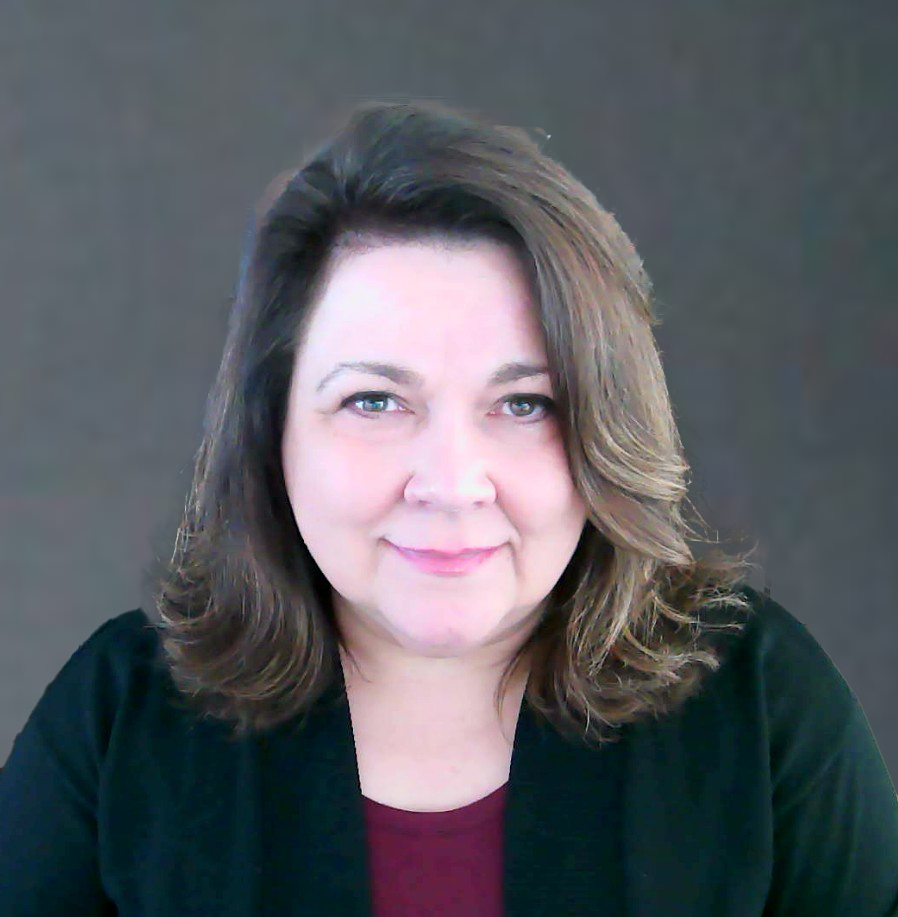
Professor
Rebecca Barnes brings over 20 years of experience in business management, program development, and financial planning, drawing on a diverse career in both corporate and educational settings. As Academic Program Director at Bellevue University’s College of Engineering, Technology, and Management, she guides the creation of career-focused programs that serve thousands of adult learners. Her background spans teaching, curriculum design, and practical leadership in management, operations, project management, and personal finance.
Rebecca is committed to modernizing instructional practice, integrating interactive platforms, simulations, and data-driven assessment methods to help learners build meaningful, real-world skills. Honored for her team’s work in advancing applied learning and equity, she collaborates with organizations to develop educational solutions that address today’s workforce needs. Her approach centers on making education practical, accessible, and impactful for working adults navigating a rapidly changing professional environment.











